
Towards meaningful online connections: Indiana entrepreneur helps firms navigate social media

Building opportunities for women in Ghana
A look at MEDA’s leaders: Presidents past and present
Using technology to connect African farmers and manufacturers Seed growth and leadership
March April 2024
Where Christian faith gets down to business
Earliest MEDA leader had a range of successful businesses
This issue includes a story (page 6) about the people who have led MEDA during its first seven decades. Space does not allow for a full recounting of the contributions made by all of its presidents, let alone the significant work done by volunteer board executives such as Erie Sauder, Orie Miller, Milo Shantz, and others.
The remarkable career of one of these early leaders, Edward Joel Peters, bears remembering.
EJ Peters was born in Saskatchewan in 1905 and moved with his father to California’s San Joaquin Valley in 1920. The family initially farmed grapes on a 40-acre plot, but it was not a very profitable business, so EJ worked in a bank.
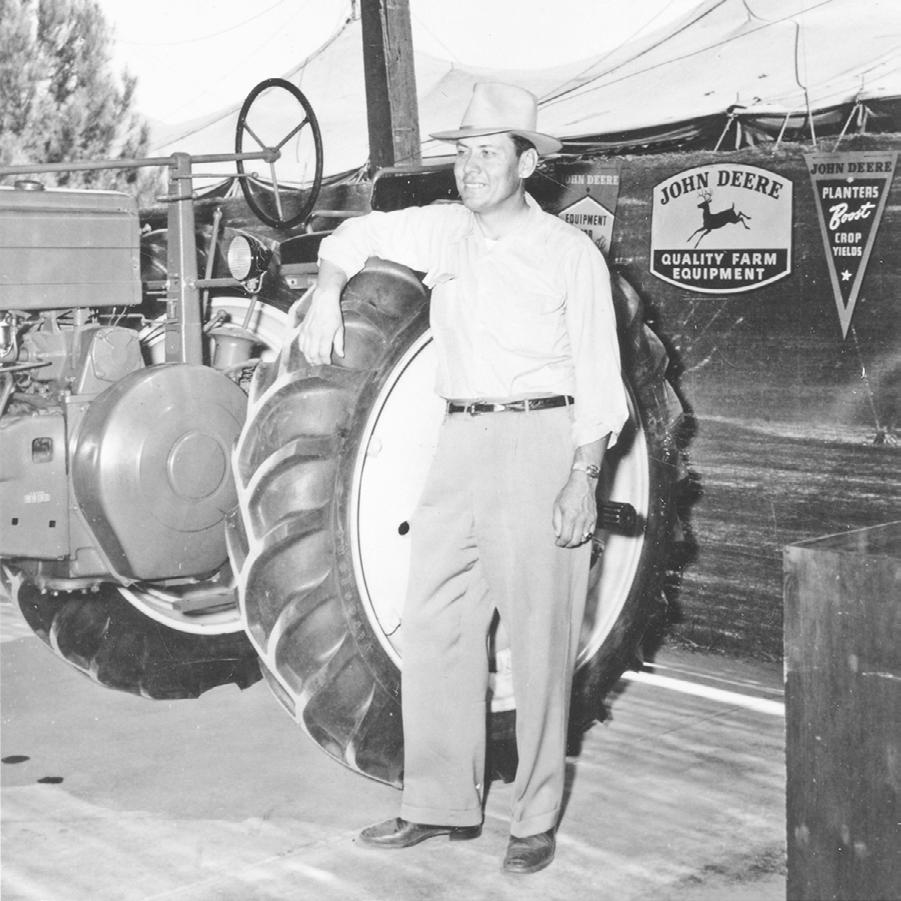
faith-related leadership positions that included his work with MEDA and chairman of the Mennonite Brethren U.S. Conference Board of Education.
As one of the eight founding businessmen who invested $5,000 each to start MEDA, Peters visited Paraguay “to assess and nurture” the organization’s earliest projects there. He served as MEDA’s first board chair and appears to have been a part of the board executive team until his passing in 1973. .
In the early 1930s, he started Maple Leaf Enterprises, a name that may have been a nod to his Canadian roots. Initially, it washed and graded potatoes for area farmers.
Maple Leaf’s farm operations eventually reached three thousand acres under cultivation. The firm grew cotton, potatoes, and alfalfa. Peters’ work in the potato industry was so notable that he appeared in a Life magazine photo spread about California’s “Shirtsleeve Millionaires” in the September 3, 1951, issue. In that era, Life magazine was published weekly and was a pretty big deal.
Life does not permit reproduction of its early photos, but patient searchers can find the issue and article using the Google

Books search feature. The feature uses the headline “Praying Potato Packer” with a photo of Peters eating grapes with his family beside their outdoor pool. It noted that at weekly breakfasts in Wasco for his farm staff, he improvised topical prayers.
Several books about Mennonites in California refer to his multiple involvements, most notably “For Everything a Season: Mennonite Brethren in North America, 1874-2002.”
Peters’ business interests also included a petroleum bulk plant, a cotton gin, a grain elevator, a radio communications and farm equipment sales division, and KWSO radio, which broadcast classical music and religious programming in an area where country and western music was the norm.
He was actively involved in various civic organizations, including leadership positions in the National Potato Council, the YMCA, and Boy Scouts of America. A member of the Mennonite Brethren Church, Peters also held
Ghana’s next generation leaders
We have two stories in this issue about young Ghanaian entrepreneurs who are juggling business ventures back home while pursuing graduate studies in Waterloo, Ontario.
Both have family members working in agrifood and grew up wondering whether more could be done to assist small-scale farmers.
Lydia Konlan (story page 13) worked to support female farmers with several agencies in Ghana before starting her own company in 2021. Farmicle Grow aims to connect farmers in remote communities with buyers and the ag extension services they need to learn how to get the best prices for their crops.
Kwaku Twum (story page 19) first became interested in using geographic information systems (GIS) technology as a way of predicting flooding problems in the suburbs of Accra, Ghana’s capital city, where his family lived. Now Mapkot, the company he cofounded, is using GIS to connect farmers and food processors. .
2 The Marketplace March April 2024 Follow The Marketplace on Twitter @MarketplaceMEDA
Roadside stand
Ed Peters photo courtesy Ed Peters collection, Fresno Pacific University archives
Ed Peters was MEDA's first board chair.

MEDA’s leaders
Meet the people who have headed MEDA over its first seven decades and the changes that occurred during their eras.

A desire to improve farmers’ lives
Growing up in a large farm family in Northern Ghana, Lydia Konlan wondered why no one helped her parents or their neighbors overcome their challenges. Addressing those problems has guided Konlan’s university studies, early jobs, and business ventures.
Growing seeds By Nathan Good Pennsylvania pastor and entrepreneur Nathan Good reflects on spiritual lessons learned from planting seeds, both literally and metaphorically, and tending plants.
19
Technology as a connection point
Kwaku Twum thinks Geographic Information Systems (GIS) technology can improve the lives of Ghana’s small-scale farmers by connecting them with food manufacturers. His company, Mapkot, develops products to make that future a reality.
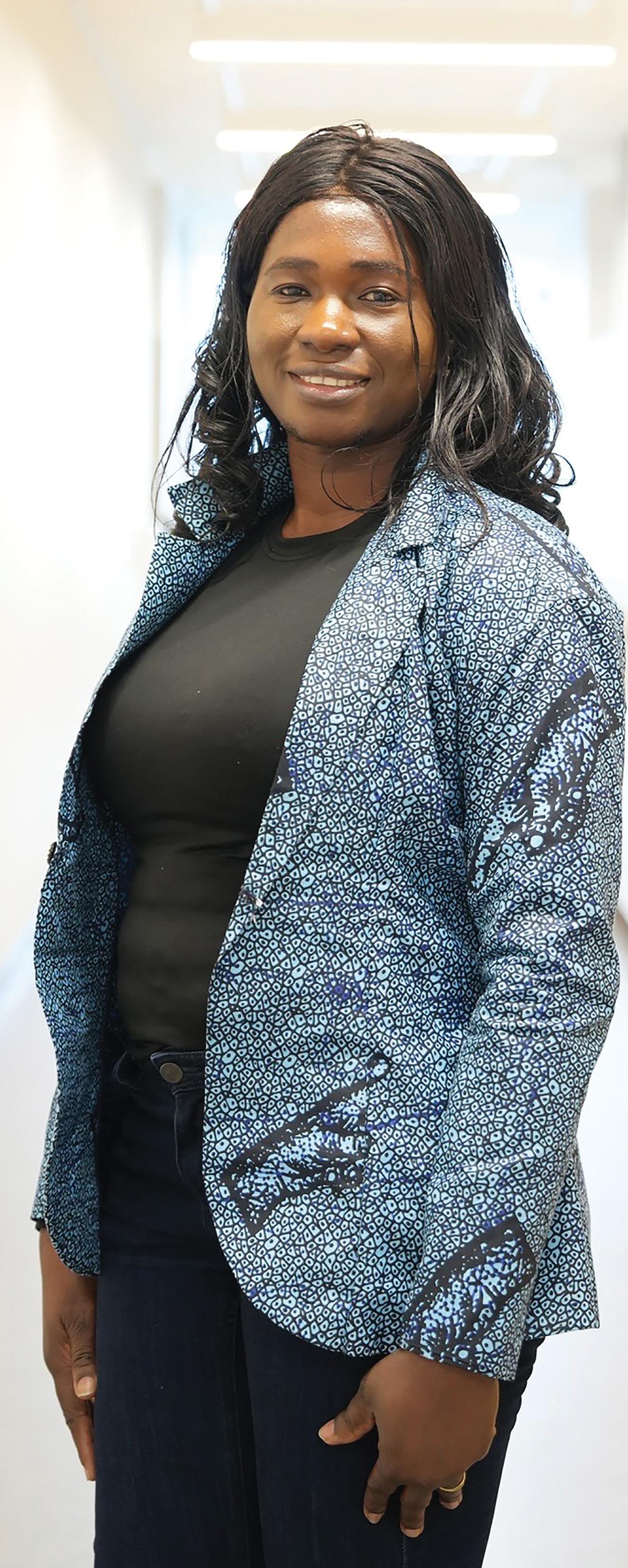
22 Roadside stand 24 Soul Enterprise 16 Soundbites 22 Books in brief
In this issue
Shorter good reads
6 Features 13 17
3 The Marketplace January February 2024
Early MEDA leaders Lloyd Fisher (centre), Paul Derstine (left) and Neil Janzen (right).
Focusing on Fasting
By Carol Penner
While they were worshiping the Lord and fasting, the Holy Spirit said, “Set apart for me Barnabas and Saul for the work to which I have called them.” — Acts 13:2
READ: Acts 13:1–5
In the Hebrew Bible and the New Testament, we see people fasting as they listened for God. They gave up certain types of food or certain meals, or they removed themselves to lonely places. Fasting is a form of self-discipline. Every time you crave the thing you miss, it calls you to prayer. The important thing is not what you are giving up, but rather the orientation toward God.
Fasting has long been associated with Lent, when we reflect on Jesus’ passion as well as our sins. Perhaps you know someone who has given up something for Lent. I know people who have given up chocolate, or coffee, or something technological like social media for a period of forty days. If trusting in God is a place you are trying to reach, fasting is a vehicle to help take you there.
called to help those in trouble. She always carried with her a small card that said, “Jesus, I trust in you.”
At the risk of her life, her network smuggled 2,500 Jewish children out of the Warsaw Ghetto before they could be deported to death camps. Sendler kept careful records of the names of the children and their parents and the homes where they were hidden.
Sendler was eventually caught and imprisoned. In her cell, she
had no Bible but only the small card saying, “Jesus, I trust in you.” As she experienced interrogation and torture, she never revealed the location of the archive of the children’s parents or the identities of other Resistance members.

I think of Sendler in the prison cell, where so much had been taken from her — her liberty, her friends, her possessions, her autonomy over her body. She had only that small scrap of paper. And in that place of extreme deprivation, God met her. On the day Sendler was to be shot, God miraculously provided an escape, although she would carry the scars of her imprisonment for the rest of her life. In prison, Sendler wasn’t fasting voluntarily; although deprivation was forced upon her, her trust in God solidified.
Irena Sendler was a young Polish woman who worked in the Resistance to the Nazis in World War II. She was a devout Christian, and she believed that she was
“If trusting in God is a place you are trying to reach, fasting is a vehicle to help take you there.”
In my early adulthood, I learned about a sad story from my own family. My paternal grandparents were new immigrants to Canada, and they clung to their own cultural group, maintaining their language and traditions in this new environment. All my father’s family married people from this particular cultural group, but my father fell in love with someone from a different group. He knew his parents wouldn’t approve, so he eloped
4 The Marketplace March April 2024 Soul Enterprise
with the woman he loved. He came home and told his parents he was married.
They would not forgive him. They were so furious with him that they said they would not meet his new wife. They refused to meet my mother for years until my oldest sister was born, at which time our family was reluctantly let back into the fold.
I wonder what that forced exclusion was like for my mother, shunned from joining a family because she had a different cultural heritage. The distrust and abandonment undoubtedly added to marital tensions, and when I was two years old, my parents split up. My family did not talk about this messy story. I didn’t hear about it for years, because when I was four years old, my mother died, and the grandmother who had excluded her welcomed my sisters and me into her home for four years until my father remarried. I had warm feelings toward this grandmother, who died when I was twelve. When I first heard this painful story as an adult, I was filled with anger and bewilderment toward my grandmother. How could she have acted so horribly? How could someone who was so generous to me be so ungenerous to my mother?
As I reflect on my family history, with these deep valleys of unresolved hurt, I am struck by how deeply my family needed the practice of fasting and giving something up. Not the practice of giving up food, but of giving up grudges. Giving up anger. Giving up prejudice. Turning to God and remembering that we are all God’s
beloved children.
I wonder whether my grandmother ever regretted her actions toward my mother. I never heard that she gave anyone an apology. But perhaps in her decision to care for me and my sisters, she worked out her regret through positive actions. I know she had a deep Christian faith, and I remember seeing her reading her Bible every day. I am inspired by Sendler’s story and her little card. Jesus, I trust in you. God is working in ways we cannot always fathom.
Churches in North America are dividing over so many different issues. Money, LGBTQ+ inclusion, women in ministry, and politics. People on both sides of an issue condemn the other side. The fruit of this judgment is not love, joy, and peace but loss, violence, and fractures in the church. What if instead of arguing over this or that interpretation of the Bible, we decided to participate in a communal fast from hatred of each other? Could “Jesus, I trust in you” be our motto?
Perhaps you have given up something for Lent already or have been thinking about doing so. When we fast, the longing for that thing will remind us to pray or will free up time for us to do so. In our longing for God, we are sure to meet the one we are seeking.

PRAY:
God, we show our devotion in different outward ways; you see our hearts, and our sincere longing for you. When we have unresolved hurts, you are with us as we tell the stories of our lives. We trust that you will, in your good time, deliver forgiveness into our lives, a gift that sets us free.
We pray all this in the name of Jesus, who is truly trustworthy. Amen. .
Excerpted from “Unburdened: A Lenten Journey toward Forgiveness (A Daily Devotional)” (Herald Press, 2024). All rights reserved. Used with permission.
Carol Penner has worked as a pastor and chaplain. She is currently an assistant professor and director of the theological studies program at Conrad Grebel University College. She is the author of "Every Day Worship" and "Healing Waters: Churches Working to End Violence Against Women." She writes and speaks about worship, including for the Rejoice! devotional, Canadian Mennonite magazine, and on her blog, LeadingInWorship.com

5 The Marketplace March April 2024 Volume 54, Issue 2 March April 2024 The Marketplace (ISSN 0199-7130) is published bi-monthly by Mennonite Economic Development Associates at 532 North Oliver Road, Newton, KS 67114. Periodicals postage paid at Newton, KS 67114. Lithographed in U.S.A. Copyright 2023 by MEDA. Editor: Mike Strathdee Design: Ray Dirks Postmaster: Send address changes to The Marketplace 100 S Queen St Ste 235 Lancaster, PA 17603-5368 Change of address should be sent to Mennonite Economic Development Associates, 100 S Queen St Ste 235, Lancaster, PA 17603-5368. To e-mail an address change, subscription request or anything else relating to delivery of the magazine, please contact subscription@meda.org For story ideas, comments or other editorial matters, email mstrathdee@meda.org or call (800) 665-7026, ext. 705. Subscriptions: $35/year; $55/two years. Published by Mennonite Economic Development Associates (MEDA). MEDA’s economic development work in the Global South creates business solutions to poverty. MEDA also facilitates the connection of faith and work through discussions, publications and conventions for participants. For more information about MEDA call 1-800-665-7026. Web site www.meda.org Want to see back issues or reread older articles? Visit https://www.meda.org/download-issues/ The Marketplace is printed on Rolland Enviro® Satin and is made with 100% post-consumer sustainable fiber content, FSC® Certified to help meet client sustainability requirements, Acid Free, Elemental Chlorine Free Cover photo of Macy Troyer by Myriam Nicodemus
A 70-Year Journey of Leadership and Innovation at MEDA
A look at people who led and changes that occurred during their eras
As MEDA celebrates 70 years of working with entrepreneurs to create business solutions to poverty, this issue looks at the organization’s top leaders, past and present, and the changes to MEDA that have occurred during their time.
MEDA’s first leader was a California businessman. Edward Joel Peters was one of eight businesspeople who agreed to form MEDA in late 1953. He served as the organization’s earliest board chair.
During MEDA’s formative years, the board executive acted as management, helping to oversee investments and project work.
Peters and Erie J. Sauder, MEDA’s first corporate secretary, served as MEDA officers for two decades, a remarkable long-term commitment.
In the first 15 years of MEDA’s existence, there were 33 projects in operation in six countries, retired Goshen College business professor Leonard Geiser noted in a speech
to members of MEDA’s Michiana chapter on MEDA’s 65th anniversary in 2019.
“Early MEDA was not for the faint of heart as members were assigned projects and were expected to visit the projects periodically and to provide ongoing counsel,” Geiser said.
Ed Peters juggled many other responsibilities with his MEDA commitments. The Fresno Pacific University Library holds Peters’ papers. It describes Peters as “a prominent California agricultural, civic, and Mennonite Brethren Church leader. He was a successful potato farmer and held several local and national leadership
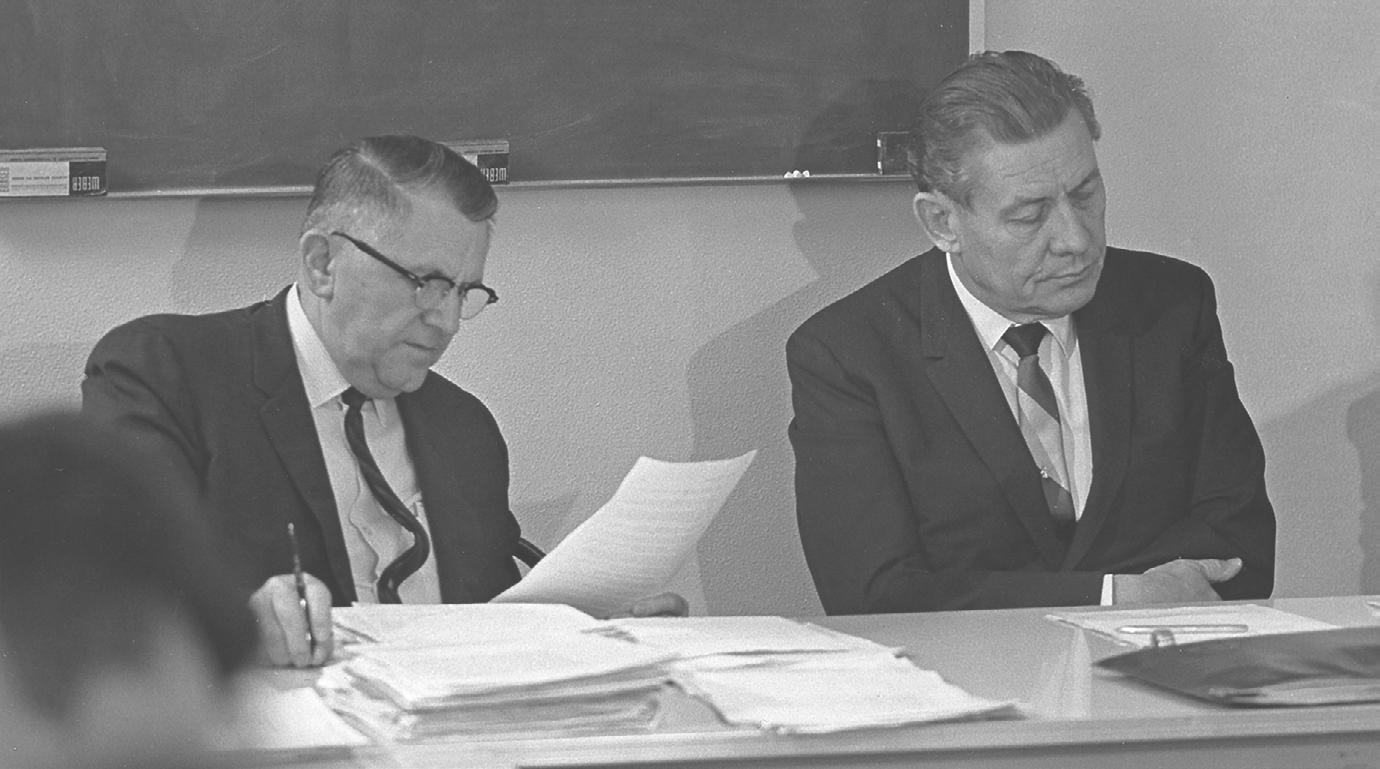
positions in the potato industry.”
Lloyd Jacob Fisher, MEDA’s first full-time North American executive secretary, joined the organization in 1969. But his ties to MEDA go back nine years earlier.
In July 1960, he and his wife, Evelyn, were seconded from Mennonite Central Committee (MCC) to work with MEDA in Paraguay. Minutes from a March 1960 MCC executive committee meeting show they would each receive allowances of $10 a month.
The Fishers’ economic development efforts led to a farmers’ credit plan for the Volendam Colony. The settlers that founded the Volendam colony came to South America from Berlin, Germany, in 1947, fleeing communism.
Lloyd Fisher drew on his experience with a farm cooperative in Oregon to develop a system of shortterm farm credits, a groundbreaking innovation for Paraguay at the time. The program was in place for 12 years and had a repayment rate of over 98 percent. He made the first MEDA loan for a tractor in the colony. At the time of his final visit to the colony in 1997, 53 tractors and 38 combines were in use.
Fisher led MEDA from being an organization where board officers such as Erie Sauder, Lyle Yost, Levi Weber, and Orie Miller were overseeing programs in various parts of the world to more formal approaches.
6 The Marketplace March April 2024
Erie Sauder (left) and Ed Peters (right) were two of MEDA’s earliest leaders. Peters was the first board chair. Sauder served as corporate secretary.
Erie Sauder and Ed Peters photo courtesy of the Sauder family
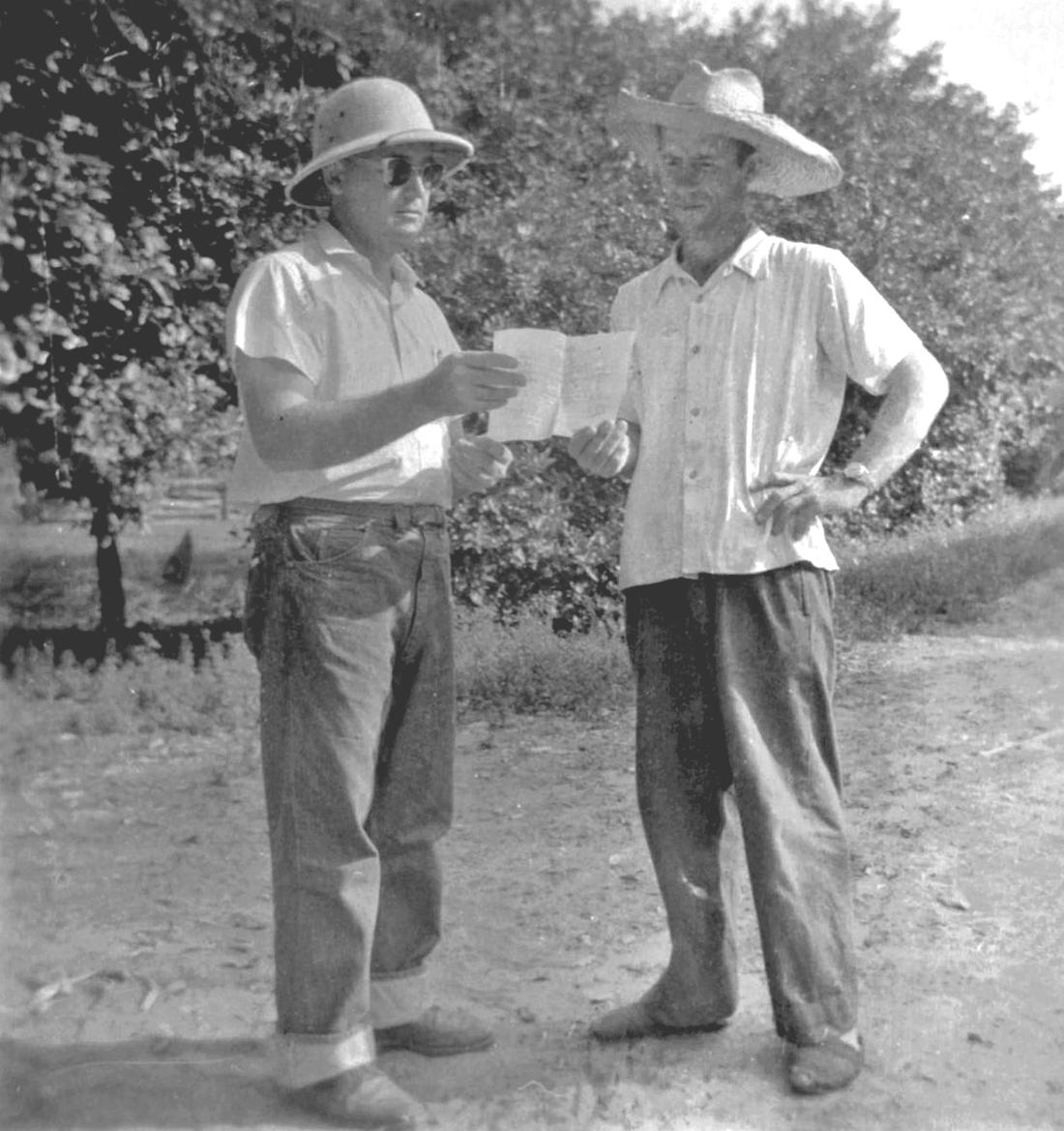
In 1976, Fisher hired MEDA’s first full-time international staffer, Ken Graber. Graber worked in Bolivia and later directed MEDA operations in South and Central America.
When Fisher retired in 1981, MEDA had undertaken 422 global projects, of which 87 percent were considered successful.
After Fisher’s retirement, MEDA’s board interviewed two staff members — Paul Derstine and Neil Janzen — for the top job.
Derstine was chosen as president in a close vote, with Janzen taking on the role of vicepresident, Wally Kroeker wrote in The Marketplace magazine in 2003.
“Derstine would carry some international assignments but would primarily look after domestic activities, such as recruiting more members and organizing chapters, while Janzen would direct most of MEDA’s overseas development
work.”
But a year later, Paul Derstine suggested that the two men switch roles and titles, Janzen wrote in his 2022 memoir, “Memories of a Journey with MEDA.” Derstine wanted to work exclusively with MEDA’s international programs, Janzen wrote.
Derstine “also felt that the president should be a person who would manage MEDA’s emerging domestic programs since it involved a significant amount of direct engagement with members.”
Janzen and Derstine proposed the switch to the MEDA board, which approved the changes. A few years later, Derstine left MEDA to work in the private sector.
Neil Janzen oversaw significant changes to MEDA. In the early 1980s, he and Derstine decided it was appropriate to “rationalize” MEDA’s
international work, which had grown to 21 countries and several continents. That process included closing a project in Ethiopia.
Before becoming president, Janzen also established MEDA’s first Canadian office in Winnipeg, Manitoba. MEDA had outgrown its shared space in the Akron, Pennsylvania, MCC office. Derstine set up a MEDA office in nearby Ephrata, while Janzen and Henry Fast occupied a small space in the MCC Canada/Manitoba complex.
Four years later, MEDA’s Canadian staff and people from the MCC Food Bank (which became the Canadian Foodgrains Bank) moved together to a downtown Winnipeg office complex where MEDA had office space for over 30 years.
In his memoir, Janzen lists eight achievements during his tenure at MEDA. First was attracting a highly motivated and professional staff and building a team with a long-term commitment to MEDA. The second was keeping MEDA as a single binational entity. Developing supportive partnerships with government, non-profits, and church organizations and transforming MEDA’s annual
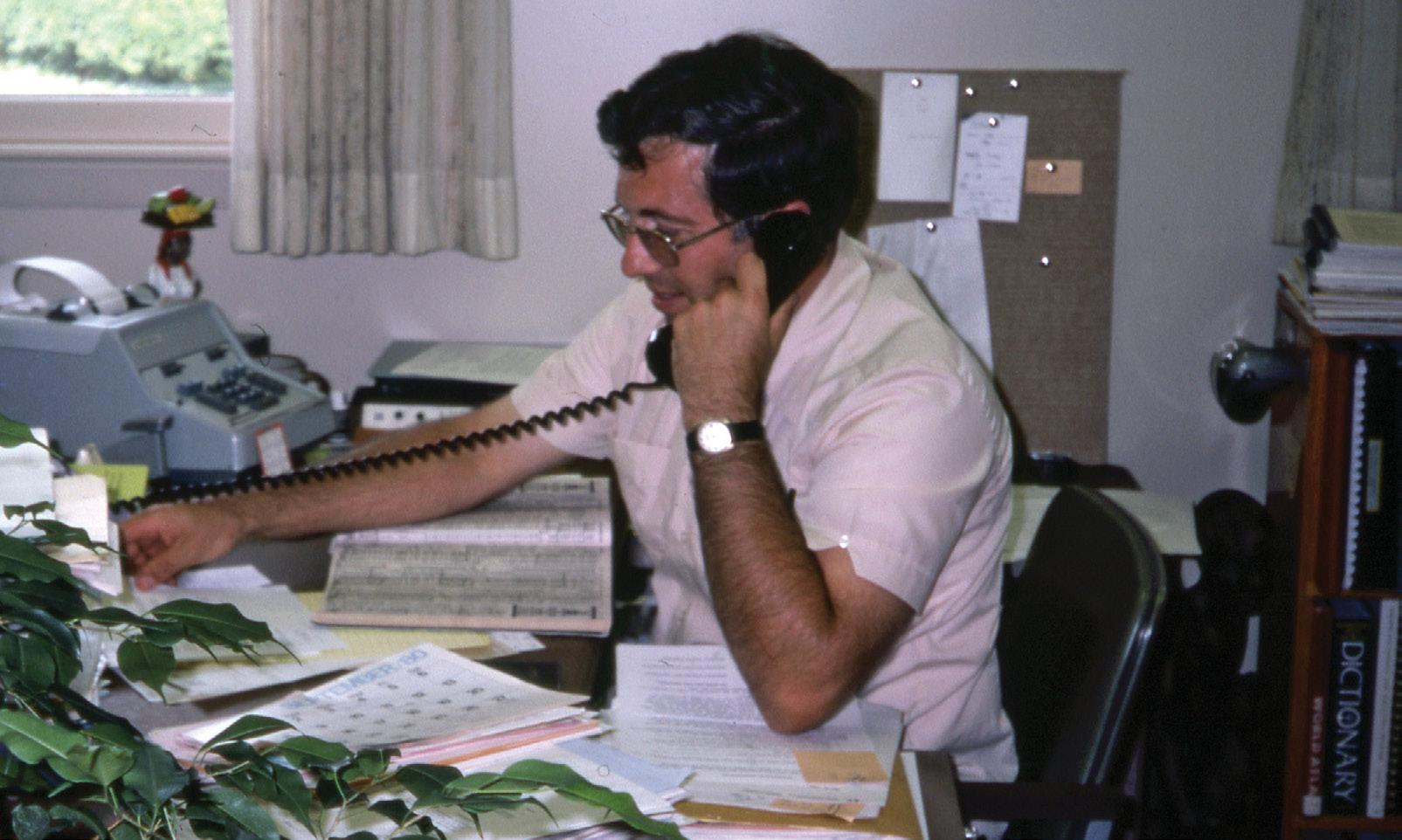
7 The Marketplace March April 2024
Lloyd Fisher (left) in Paraguay with “Herr Peters,” in June 1961. Fisher, who would become MEDA’s first paid executive secretary in 1969, is explaining the terms of a MEDA loan to Peters.
Lloyd Fisher photo courtesy MCC Photo Collection, Akron, Pennsylvania
Paul Derstine served a year as MEDA president, then asked to swap jobs with v-p Neil Janzen.
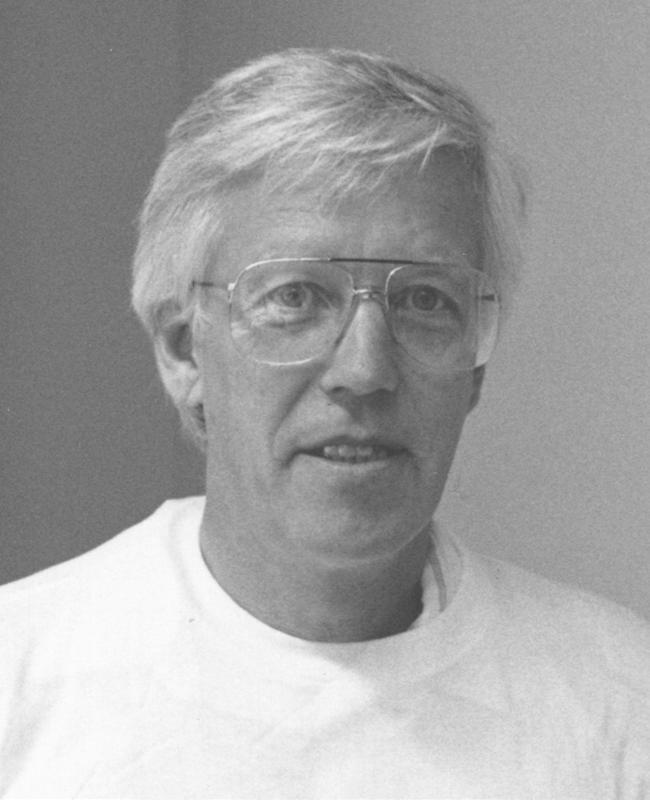
convention into a major event for the organization and its members were also highlights. He also noted an annual 15 percent increase in contributions from members, incorporation of microenterprise lending into MEDA’s operations, and work with board chairman LeRoy Troyer on updating board governance.
Janzen’s successor, Lee Delp, was one of MEDA’s shortest-serving presidents. He resigned after 1.5 years on the job. In a resignation note published in MEDA’s 1993 annual report, he cited the need to care for a disabled son, not allowing him to “maintain the travel needed to fulfill the duties of MEDA president.”
Delp’s career included work in insurance as a senior vice president with National Liberty Corporation. He also worked as CEO of MOPAC (one of the largest renderers and used cooking oil recycling centers in the eastern US) and ran a consulting business. “During the course of his career, he was on the board of 13 companies and chaired 9, including leadership roles at Grace Mennonite Church and the international level with the Mennonite Church,” his 2021 obituary said. “He always saw
himself as a pastor who happened to be in the business world.”
Ben Sprunger had a varied management career in academia, the non-profit sector, and running a consulting firm before joining MEDA in 1994 as Delp’s successor. He was interviewed for the president’s job twice. The first time was in 1992 when the board decided to hire Delp.
One of the achievements he looks back on with pride from his nine-year tenure is assembling the “dream (leadership) team” of Allan Sauder, Kim Pityn, Gerhard Pries, Gerald Morrison, Jerry Quigley, and Wally Kroeker. “Nothing gave me more pleasure than continually observing this team at work and their successes,” he said.
Programmatically and institutionally, he considers MEDA’s decision to financially augment its development efforts by raising capital “for which we would have obligations to pay interest, but also to repay capital” a significant step in MEDA’s evolution.
There were some bumps in the road during Sprunger’s term. During his second year, a $40,000 fraud scheme emerged at a project in Nicaragua. While that problem
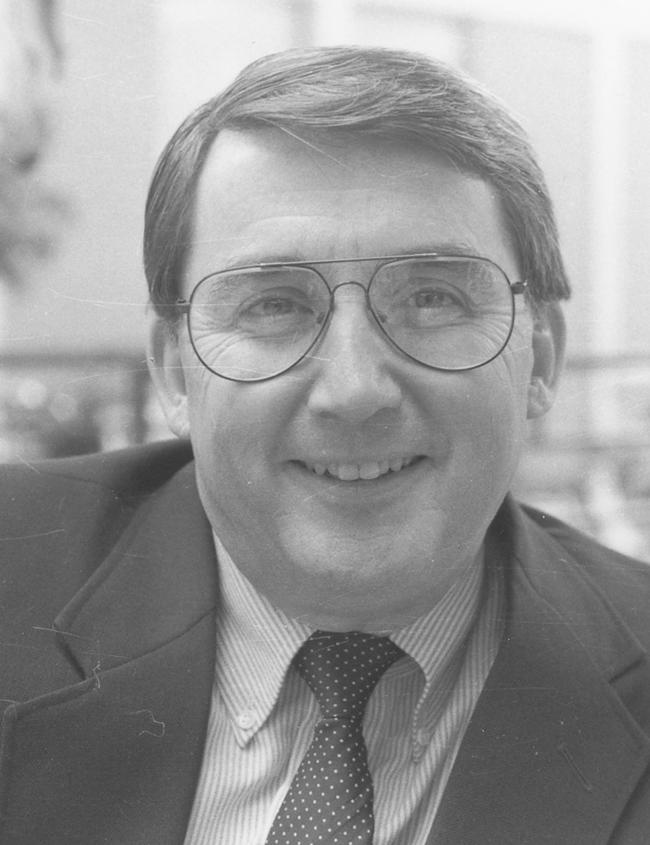
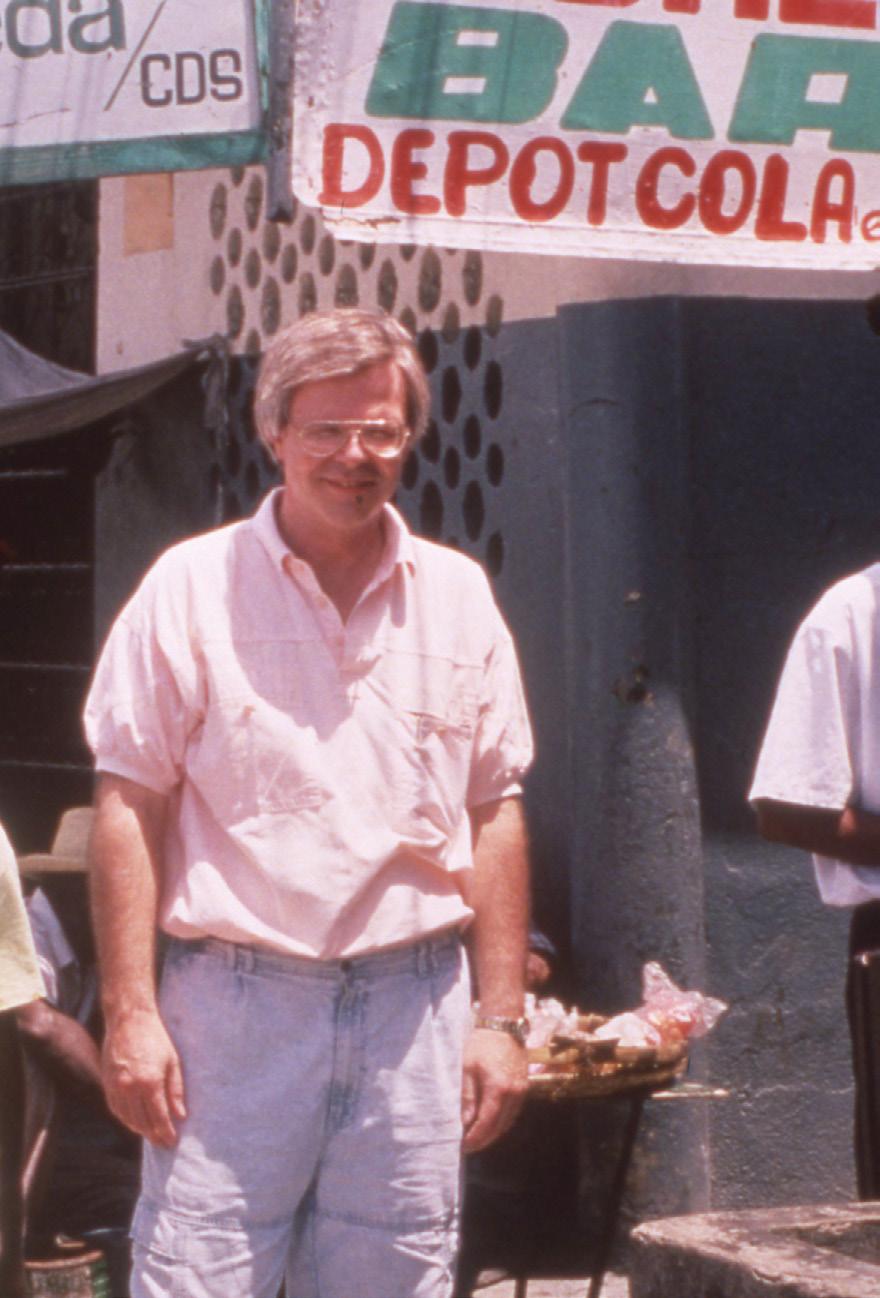
was “quickly discovered, contained and rectified,” a more significant, similar problem arose that summer. “A few MEDA Tanzania staff colluded in what turned out to be a $300,000 USD ($580,000 in 2023 dollars) embezzlement scheme.”
MEDA quickly investigated the crime and repaid the stolen amount, but “the perpetrators were never arrested. With the money embezzled, they bribed officials conducting the investigation.”
Pressure from the Russian mafia to pay bribes in that country, followed by an $800,000 US tax fine when MEDA refused to pay any bribes, forced the organization to evacuate its staff and shutter its Russia program.
“MEDA was a perfect capstone to three decades of CEO or equivalent leadership in education, church, and business,” he writes in an ongoing memoir project. “I loved, respected, and cared deeply for the MEDA staff. As one observer noted, I was 150 percent bullish on MEDA.”
Allan Sauder joined MEDA in 1987 and served as president from 2002 to 2018. He holds the record
8 The Marketplace March April 2024
Neil Janzen
Lee Delp
Ben Sprunger photo courtesy Centre for Mennonite Brethren Studies, Winnipeg, Manitoba
as the longest-serving MEDA president to date.
One of Sauder’s predecessors, Neil Janzen, was enrolled in the Master of Business Administration program at Western University (formerly UWO) in London, Ontario, at the same time as Sauder.
Sauder worked as a project manager in Tanzania and then as director of international operations before becoming president.
He oversaw a period of tremendous growth at MEDA. Revenues from institutional contracts grew more than five-fold during his tenure as president. Gifts from private donors grew at an even faster rate. MEDA’s budget in his final year heading the organization reached $35 million, seven times what it was when he took office.
One of the more significant strategic shifts at MEDA under Sauder’s presidency was MEDA’s move to a lead firm model. Where MEDA staff had previously worked directly with farmers and other clients, it now began providing incentives to processors and other businesses to do that training.
It “was definitely an approach
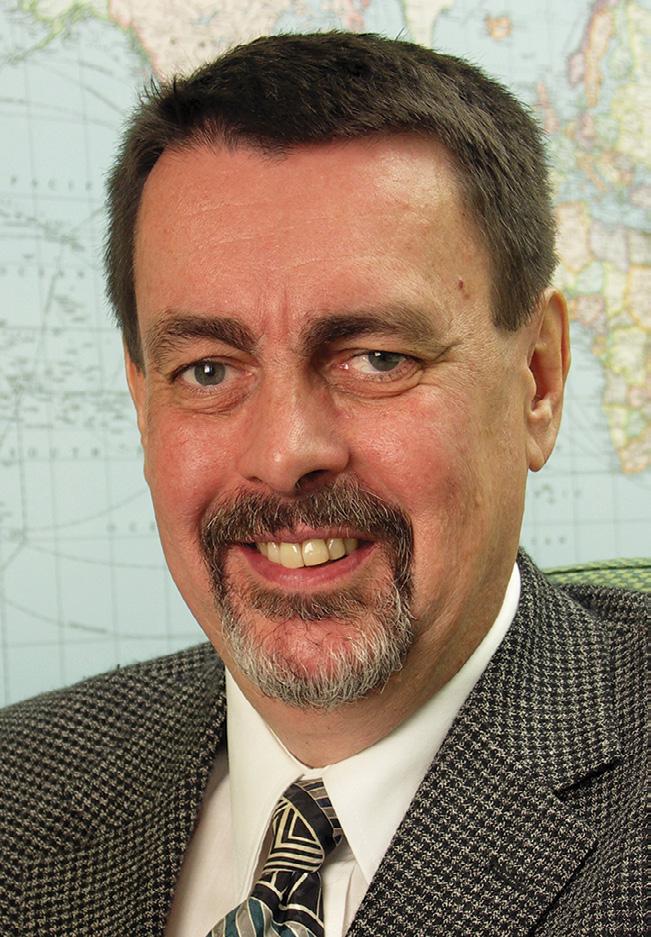
that was formalized in several projects during my tenure,” Sauder said. “The Ukraine project was a good example of this approach, but there were others, such as the earlier Afghanistan project with women gardeners.”
Dorothy Nyambi joined MEDA in December 2018, bringing a vast and deep-lived experience in international economic development. Starting her career in health, she moved into international development, where she worked in a wide range of sectors. She is the first woman and first person of African descent to head the organization.
She has ushered in an era of transformation that would ensure MEDA’s continued relevance in the context of a very rapidly changing world. During her third year, she skillfully guided MEDA to secure its largest-ever contract — the groundbreaking $200 million Mastercard Foundation Africa Growth Fund.
This transformative initiative, a pivotal component of MEDA’s Vision 2030 strategic plan, is set to generate 15,000 decent jobs for women and youth in seven subSaharan African nations in five years. As investments from this visionary project are repaid, they will circle back to MEDA, creating a self-sustaining cycle that enables further reinvestment for additional job creation.
As part of the strategic plan, MEDA is doubling down on its focus on agrifood and agribusiness. Historically, this sector has accounted for about 80 percent of MEDA’s work, and it is the sector that most countries in the global south recognize as key for addressing poverty as well as transforming their economies. Another major pillar of MEDA’s current strategic plan is working
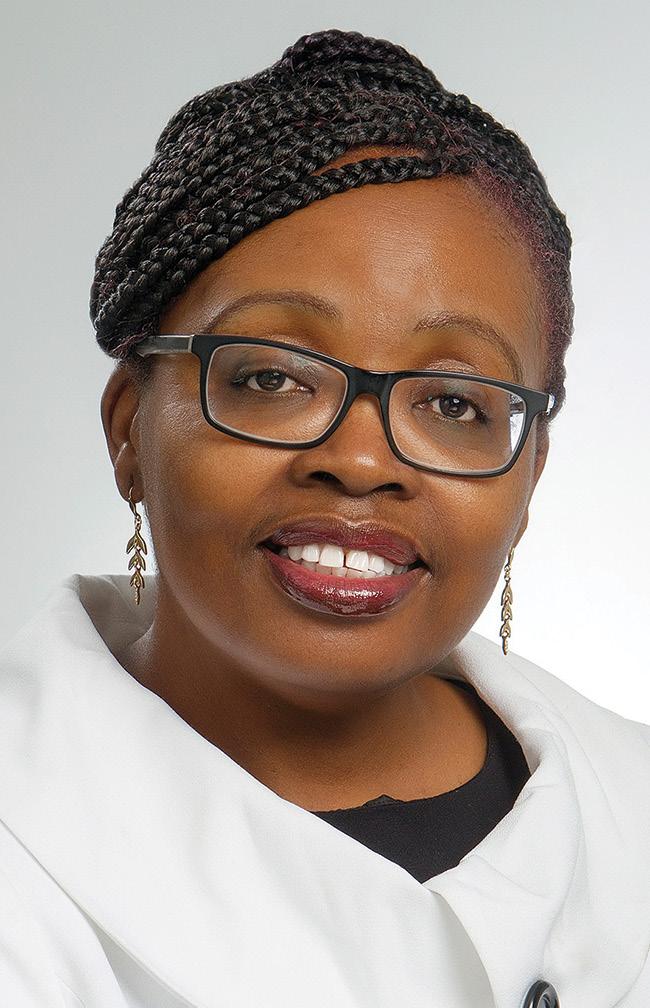
towards a North-South equilibrium.
This approach aims to increase local decision-making in the design and execution of solutions, working with partners. This will result in streamlining the number of staff positions both in the global north and global south. “The shift arises out of the reality of today’s international development context and in respect for the people on the ground who have the best solutions for their problems,” Nyambi said.
“Developing partnerships for system-level impact is also part of MEDA’s strategic plan. As we reduce and establish a leaner corporate structure, a further step for MEDA in the coming year is regionalization in the delivery and oversight of what we do and how we do it. The goal of this is to recognize the role of partners and bring greater efficiency, effectiveness, and continued proper stewardship of the resources entrusted to us.”
“No intervention can claim success and sustainability if the system on which that intervention relies is not addressed and fixed,” she said. .
9 The Marketplace March April 2024
Allan Sauder is MEDA’s longest-serving president.
Dorothy Nyambi
Aligning online communications with corporate goals
Indiana entrepreneur helps businesses navigate the world of social media
By Marshall V. King
In her early years, she used that to develop a knack for entrepreneurship.
She made and sold rubber-band bracelets or was a cosmetologist for her friends going to prom.
She performed as an Elvis impersonator at age six. By age seven, she was a dancer collecting dollars to perform the can opener or funky chicken at a party.
She’s 27 now and thriving as an entrepreneur. She was 23 when she launched Goaldy, a social media marketing firm. That company is her main focus as she helps others with marketing strategy, content creation, and building trust using social media.
In fall 2023, she launched another brand called Kindspire (combining the words “kindness” and “inspiration”). She created 30 small cards that have inspirational messages that can be used as something to share with someone else as a random act of kindness or to be used for yourself.
“But they’re really designed to be shared with other people,” Troyer says. “Kindspire is to get people to look up again and not always be on their phone. It’s to encourage interaction and just get us caring for humans again, especially in a post-COVID world.”
Her new book is also intended to inspire others and ignite a fire
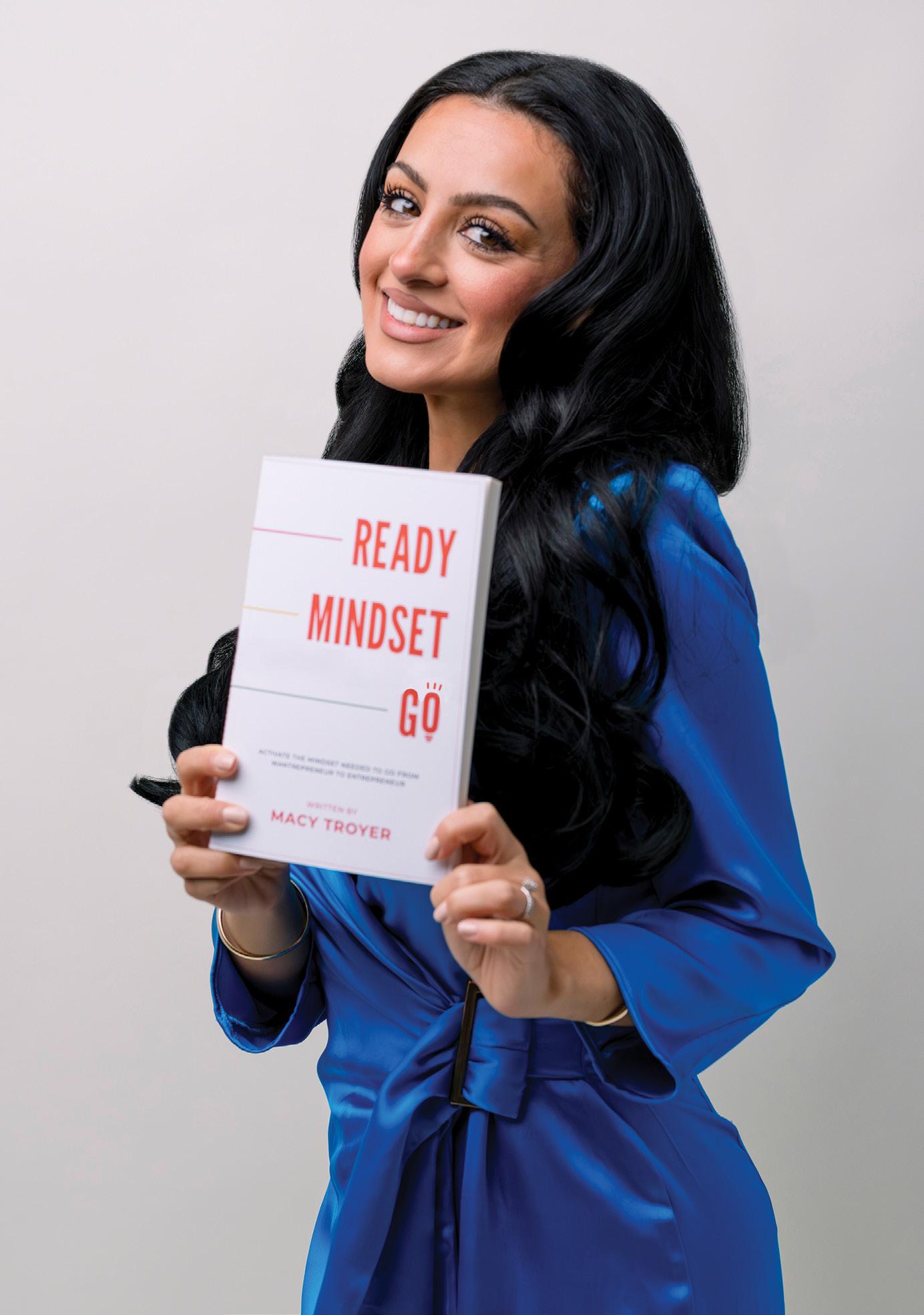
10 The Marketplace March April 2024
Macy Troyer says she was born with confidence.
Macy Troyer developed an entrepreneurial spirit at a young age.
Photos by Ninety Three Creative
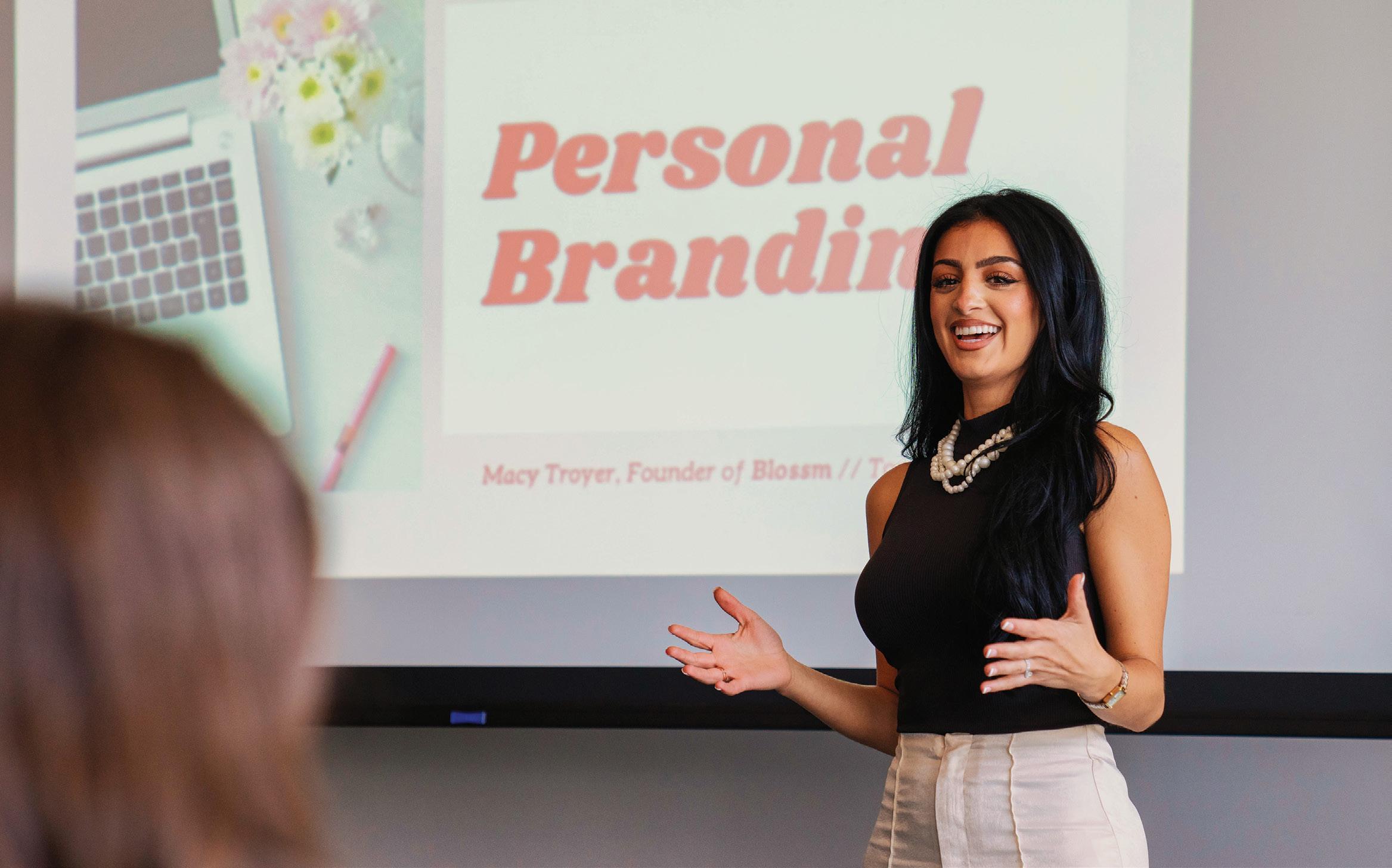
and passion in them for living, but also creating as an entrepreneur. “Ready, Mindset, Go!” is her roadmap of how she became an entrepreneur. She says others can use it to transform “from a mere ‘wantrepreneur’ to a full-fledged entrepreneur.”
Troyer’s journey started in southern Indiana, where she was born and raised. Her mother’s parents, Monda and Medhat Girgis, had emigrated from Egypt by way of Scotland and New York City.
It was there that Medhat's boss urged him to take the day off and go to a Billy Graham crusade. The Girgis were Coptic Christians who had a conversion experience that day.
The couple settled in Bedford, Indiana, where Medhat practiced medicine. Her mother married a German American, and Macy was born in their high-energy family in Bedford. After high school, she went to Indiana University’s campus in Indianapolis to study marketing, business management, and international studies at the
Kelley School of Business.
During college, she met Luke Troyer and started dating. “We both knew immediately we were going to get married,” she says.
After graduation in 2018, she married Luke and moved to South Bend to be with him. He was working at The Troyer Group, the architectural firm started by Luke’s grandfather, LeRoy Troyer. As they married and she joined the Troyer family, she learned about Mennonites.
In 2019, she went with Luke to the MEDA convention, just as LeRoy had done for many years prior to his death in 2018. “And that’s where it clicked for me of how incredible and unforgettable people that are of the Mennonite faith truly are,” she said.
“Because they love the right way. They serve the right way. They don’t just do it because they’re Christian. They truly believe it, and that’s from their faith.”
Macy Troyer worked in commercial real estate in northern Indiana.
After two years with the company, she asked her boss what her future looked like. She saw others staying in their positions for decades and realized she wanted something different than that. “I’m a lifelong learner, and growing and evolving are priorities to me,” she says.
She became a broker and, without knowing it, was also building her personal brand. She was sharing her personal story on LinkedIn and created Blossm Social Media, what she now calls a side hustle. Her plan was to use Blossm as the umbrella for her consulting work with others on social media as she built her real estate career.
Her first day as a commercial broker was March 1. Two weeks later, the COVID-19 pandemic upended her plans.
By May, she stopped doing real estate and focused full-time on Blossm, which has since become Goaldy. She’s also relocated back to Indianapolis with Luke.
She has been on social media since she was ten years old. Now,
11 The Marketplace March April 2024
Macy's Troyer's firm aims to create meaningful online content for its clients.
she and her team help others use social media to build and support their work. Troyer and the handful of people who work for her build meaningful social media posts so that their clients can focus on the things at which they excel.
While Kindspire offers a tactile product that is about not looking at your phone, Goaldy’s goal is having meaningful content when you do. Troyer believes that social media is a tool that is no longer a luxury for a business. Since many of us Google a business or look at social media before we reach out or buy a product, she wants to ensure that those are aligned with a company’s goals.
“Macy is an absolute powerhouse in the branding, marketing, and social media arena,” says Will Weed, CEO at Robert Weed Corp.
“She is ever-present, a true business partner, consistently assessing and adjusting her business for a quickly changing playing field, and I always see her out in the market making connections and getting it done! More important to me, her positive, can-do attitude is absolutely infectious. If you can’t get motivated working with Macy, you can’t get motivated at all. That energy helps remove obstacles and pave the way for the future. She makes it feel simple. It’s a burst of energy to work with Macy.”
Her goal is to showcase the authenticity and professionalism of a company in what is forwardfacing online. That is how they approach the writing, photography, and videography they create.
That doesn’t mean she wants someone to be looking at their phones constantly. In fact, she’s concerned about the impact social media is having on our mental health.
She believes time is the most valuable gift we have. She’s driven
“My priority is to feel fulfilled, honor God, and love people."
— Macy Troyer
and works hard but is so often energized by her work. She loves unplugging and will leave her phone at home and go for a walk.
Friends started asking Troyer how she built Goaldy. She thought about starting a YouTube channel to answer the question but didn’t want to have to spend all the time in front of the computer to create and maintain that.
So she started writing. “I’ve been journaling and reflecting on my experience as an entrepreneur and also doing research on what other successful entrepreneurs have faced. What they’ve done to improve their mindset is to make sure they don’t stop their entrepreneurial journey just because they get rejected or they’re lacking self-belief,” she says.
Her classes at the Kelley School of Business at Indiana University
didn’t talk about mentality or mindset. They covered pitching to investors and sales strategies, but not about how to work and live intentionally. Self-belief and selfconfidence are critical to being a successful entrepreneur.
She kept writing for two years and had a book, which she selfpublished, “Ready, Mindset, Go! Activate the Mindset Needed to Go from Wantrepreneur to Entrepreneur,” in fall 2023 and has now produced a workbook alongside it. She says the book is selling well, and the response to it has been good.
The book tells of her journey so far, but she believes much lies ahead. At one point, Macy planned out her life in great detail. Now she tries to plan a little bit day by day. “My priority is to feel fulfilled, honor God, and love people,” she says. “If I’m not having fun and enjoying my life, and joyously living,” I need to prioritize what I’m doing. And right now, I’m having a blast. I enjoy waking up. I love my work.” .
Marshall V. King is a writer and journalist based in Goshen, Indiana. You can read more of his writing at hungrymarshall.com or hungrymarshall.substack.com
Tips for social media from Macy Troyer
Troyer, founder of the Goaldy social media company, offers this advice for others on how to use social media:
• Create quality content that will speak to and help your ideal audience. Whether the audience is prospective or current customers, or potential hires, you can “educate them, you can inspire them, you can entertain them. But give them something that they will walk away after reading and be thankful that they did,” she says.
• Make sure the content is something people will be glad they spend time reading, watching, or looking at. “Time is the most valuable asset we have,” she says. “I always say quality content over quantity of content. So it’s better to have two great posts a week than five overall.”
• Deliver assurance with your posts. If your posts reflect your brand voice and tone, if any graphics and videos are top-notch, your audience will assign the quality to your brand. “You want them to know and believe that you are the best company and that they should work for, buy from, or use your services.” .
12 The Marketplace March April 2024
In Kpemale, where Lydia Konlan grew up, no one ever came around to tell farmers how to grow better crops.
Her parents are small-scale farmers, growing maize, sorghum, and vegetables, including okra and tomatoes, on a four-hectare plot in a small village in northern Ghana.
“They had too many challenges with regard to farming,” said Konlan, who is the fourth of their eight children.
No one ever trained them on how to succeed in agriculture. Her mother never set foot in a school. Her father’s education ended during middle school.
As she got older, Konlan wondered why no one was coming to help farmers. She decided to study agriculture science in high school.
When she graduated, she majored in agricultural extension and economics at the University of Tamale in Northern Ghana.
After finishing that degree, she did research with her supervisor and visited over 3,000 farmers in small communities.
Following a year of doing that work, she wanted more training. She went to Germany to study sustainable international agriculture, focusing on rural development economics.
After completing her master’s degree, she returned to Ghana with the goal of helping women farmers.
She did a six-month internship with SEND Ghana, a non-profit that advocates for women’s empowerment. During that work,
Making the links
Ghanaian entrepreneur helps women to find new crops and greater opportunities
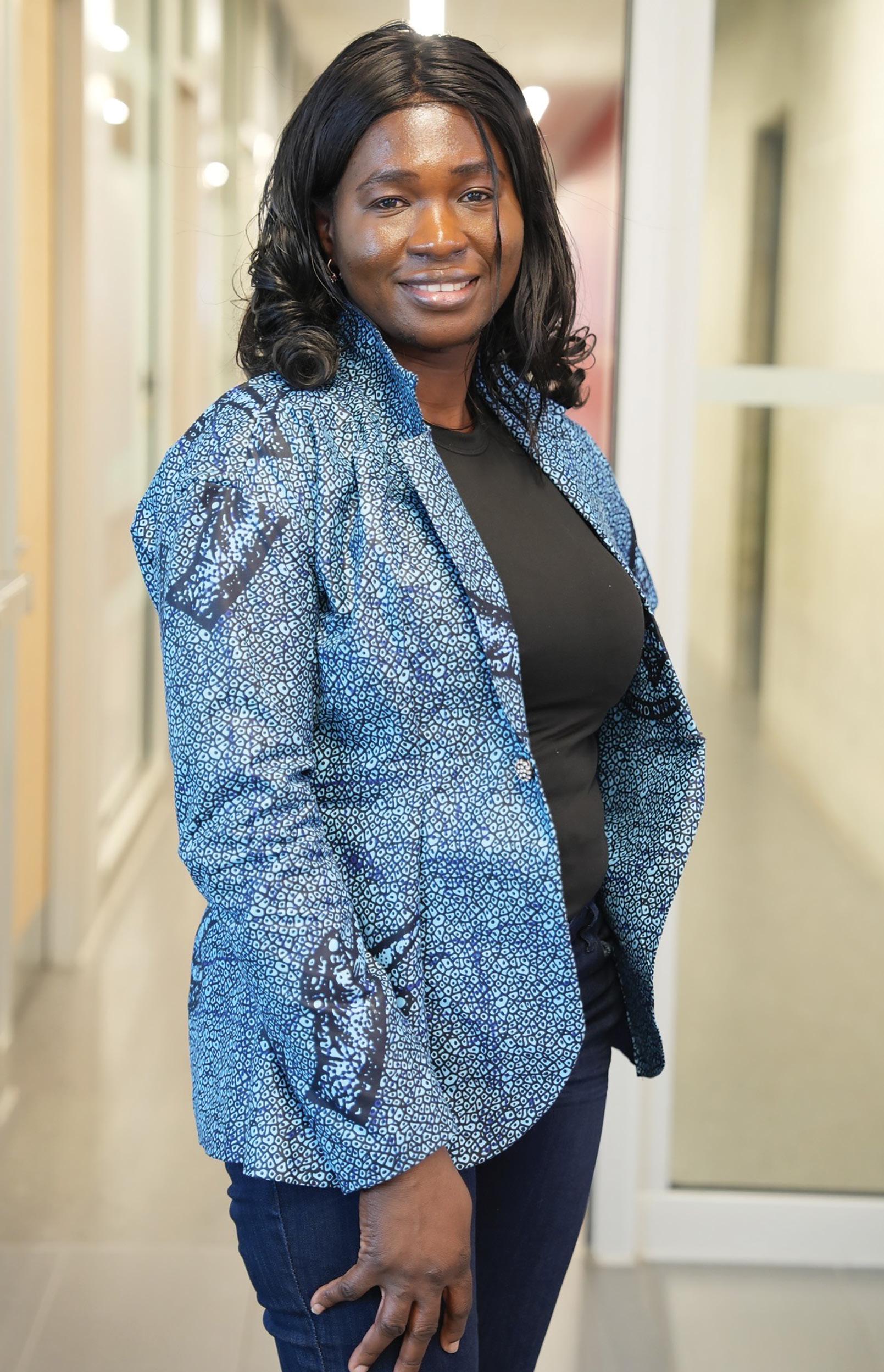
The Marketplace March April 2024 13
Lydia Madintin Konlan
she visited 133 communities in Northern Ghana. A subsequent job with a vaccine delivery company further exposed her to the challenges facing women farmers.
She then moved to Share Network Ghana. Her work there offered training for women on business, financial literacy, and how to add value to the crops they grow.
That experience led her to understand the need to support women in selling their products.
Over $1.4 billion of food produced by small-scale African farmers is spoiled. Some farmers don’t understand what the demand is for what they are growing. Others lack the ability to get their products to market.
Konlan decided to start her own business in the fall of 2021. Originally called Rural Agrihub Ltd., it was recently renamed Farmicle Grow. The new name reflects the simplicity and functionality of the company’s farm management platform for seamlessly ordering farm products, Konlan said.
The company’s goal is to connect farmers in remote communities with buyers. It teaches farmers when and what to produce and when they can sell their products.
Its first initiative was to market Bambara groundnuts, which are also known as Bambara beans.
These round beans, sort of a cross between a chickpea and a pinto bean, are resistant to harsh weather conditions but are underutilized. Konlan found partners who use the beans to make a plant-based milk substitute.
In 2022, she supported more than 2,000 farmers in 25 communities in five districts of Ghana to grow this crop. About 50 metric tons of the Bambara groundnuts were grown for export.
That experience led her to
realize that women farmers were always talking about the same thing: how could they find something they could do for themselves?
Men controlled the harvests of major crops and the money that was received when these were sold. Women do not have access to much land.
Konlan then started thinking about ways she could support women. Realizing that many people are already growing vegetables, she looked for alternatives. She came up with the idea of mushrooms.
Mushrooms are widely available and used in the south of Ghana, but not in the north. Farmers in the southern part of Ghana enjoy more rainfall and are able to plant two crops a year. Their northern counterparts can only do one crop a year.
Konlan got seed funding from the Ban Ki Moon Centre for Global Citizens in Austria, which has allowed her to run a project with 200 women in five communities. The pilot, which runs through August, is a success in terms of its acceptance, a ready market, and consumption of the product within the communities, she said.
Participants initially grew both
“If we want farmers to be aware of the needs in the market, they should be able to access the necessary inputs to support them in their production processes.”
— Lydia Madintin Konlan
button and oyster mushrooms but eventually focused just on the oyster variety. The latter type of mushroom is more resilient and able to adapt to the climate.
The mushrooms are grown in one-kilogram bags of compost, yielding as much as 75 kilograms. Women can harvest four or more crops from the same bag over the course of a month.
It costs 50 cents to make one bag. Women can sell close to $3 worth of mushrooms from that bag.
Konlan won $3,000 from the United College GreenHouse fall 2023 pitch competition. That money will be used to help women set up a compost production system, and to increase the number of women participating in the pilot to 300.
Konlan has had conversations with a US company that uses mushrooms to make alternative protein products such as mushroom burgers. That company’s Ghana operation is currently importing mushrooms from South Africa. It would like to process mushrooms in Ghana’s capital, Accra, and then send the processed product to the US.
This project is only at the discussion stage. Women taking part in the current pilot do not have the capacity to provide enough mushrooms. Meeting that demand would require massive scaling of mushroom production, she said.
Growing mushrooms is much easier during the rainy season — mostly between May and July — when the weather is coolest. It is possible to grow mushrooms during the dry season. But they need much more care, including irrigation to ensure moist ground, and keeping the surrounding environment cool enough.
She realized that to run these sorts of ventures as profitable operations, she needed more
14 The Marketplace March April 2024
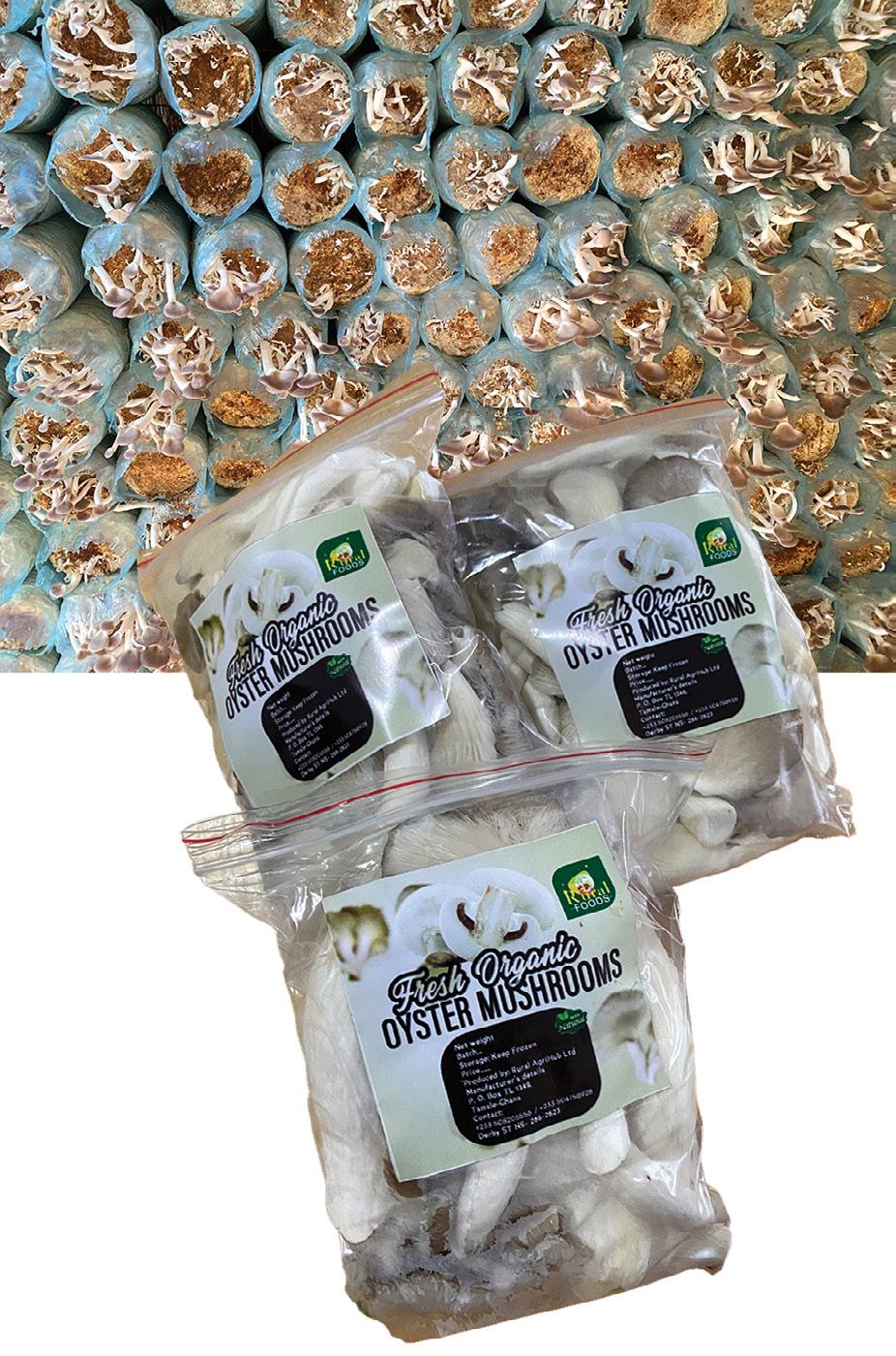
business skills. That led to her joining the one-year Master of Business, Entrepreneurship, and Technology program at the University of Waterloo in September.
Farmicle Grow has three parttime staff back in Ghana working on the mushroom pilot, turning agricultural waste into compost.
Konlan has also had a meeting with an Accra firm about sourcing 30 metric tonnes of soybeans.
Another project that is on her mind is developing an e-commerce platform and a mobile app to support these efforts. The app would be used by processors, agriculture extension officers, and individual consumers.
She is looking to recruit business development and warehouse managers. Transportation is a major challenge. Potential partners want to see that her firm has the infrastructure needed to deliver.
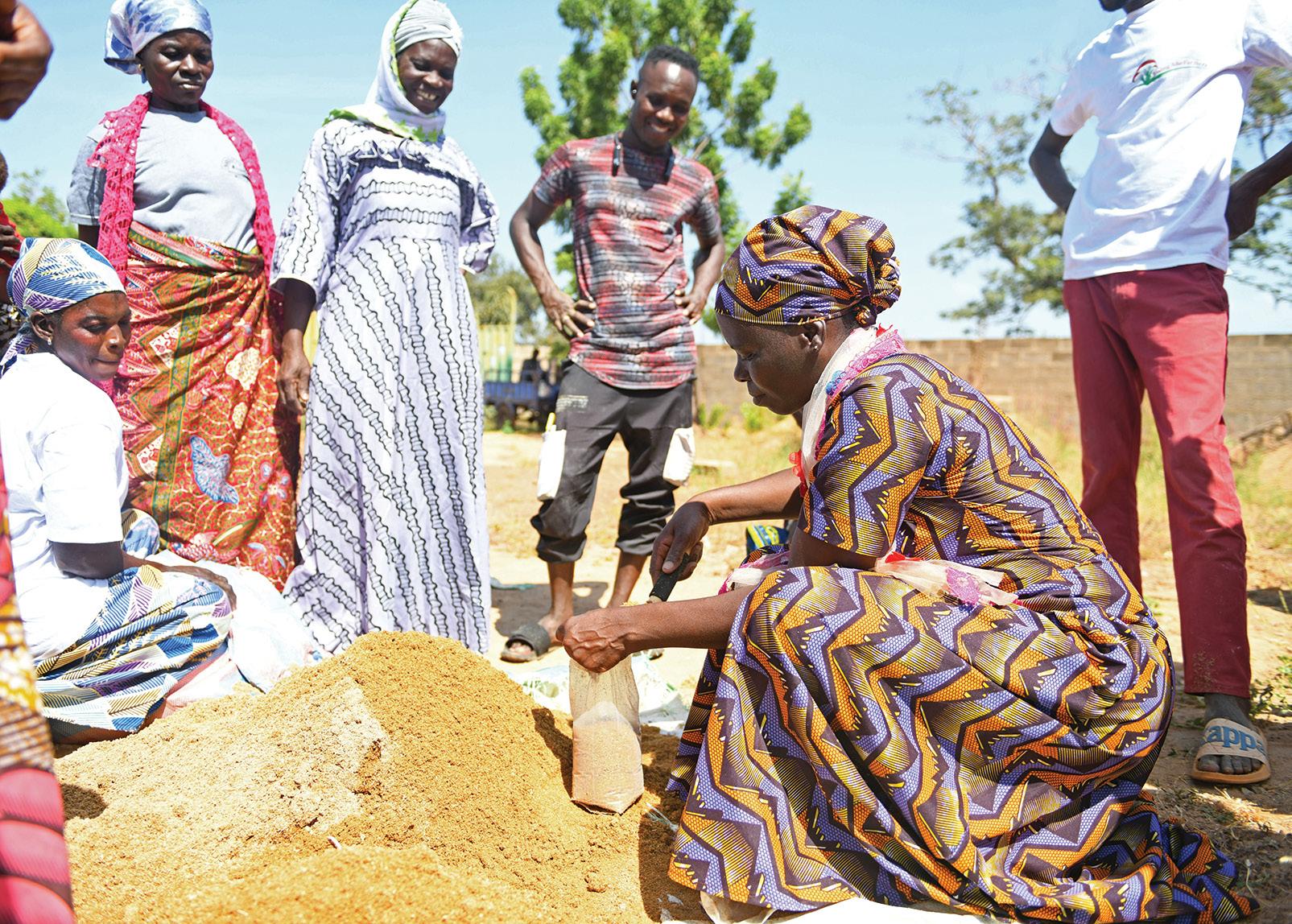
Farmicle Grow is a registered business, with an office in Tamale. Tamale is the capital city of Northern Ghana and the thirdlargest center in the country.
Within five years, Konlan wants to have a well-established marketplace where buyers can get what they want, providing markets for thousands of small-scale farmers.
During a previous pilot, she found that ag extension officers had the capacity to reach 500 farmers a month. But they were being asked to work with three times that many. “If we want farmers to be aware of the needs in the market, they should be able to access the necessary inputs to support them in their production processes,” Konlan said.
Many farmers in Northern Ghana don’t have smartphones or access to other modern technology. “Farmers need to get to a point where they have access to these
new innovations and technologies,” she said.
She wants to set up a dedicated phone number that people can call to hear voicemail messages about ag extension services.
Another pilot program that Konlan is involved with targets women growing cowpeas. Cowpea is an annual legume that produces edible beans. It is used to feed both humans and livestock.
A university in the Netherlands sponsored this pilot in an effort to find a wheat alternative for making bread. A Netherlands start-up company is looking to partner with Konlan’s firm. Her company would teach women best-growing practices, proper use of inputs, and how to process the dried beans into flour for the European Union market, she said.
“Farmers, because of climate change and other issues, they need to adapt, they need to diversify their production.” .
15 The Marketplace March April 2024
Above: Women fill bags with compost that mushrooms are grown in. Top left: Mushrooms growing in the project. Bottom left: Women farmers can sell the final product for almost six times their input costs.
Research shows why Americans think the economy is doing poorly when it isn’t
Do you ever hear a media report and think the economy is not doing nearly as bad as the story suggests?
If so, you are not alone. The Brookings Institution, a nonpartisan US research group, has been studying why this is so. Part of their work came from the Daily News Sentiment Index, a measure of “positive” and “negative” news produced by San Francisco’s Federal Reserve Bank.
Since 2018, the tone of news coverage about the economy has been much more negative than the state of the US economy, Brookings found.
Heightened political polarization and people’s tendency to watch “ideologically based cable news sources” are cited as possible explanations for this trend.
Other findings from six different studies Brookings did on this topic:
• Economic inequality tends to lead people to believe that one group’s economic success comes at the expense of others.
• In both wealthy and poorer countries, belief in conspiracy theories makes people feel that the economy is declining. They think that things were once OK, but now they are not.
• Households that are more at risk of experiencing poverty are less likely to say things are going well despite good news about the overall economy.
Postage and parcel returns
Online shoppers in France now have a new way to deal with clothing that doesn’t fit.
France’s national post office, La Poste, is experimenting with in-store change rooms, The Guardian says.
Standalone changing rooms in the shape and color of a French mailbox include “a chair, mirror, and shelf to place packages for onthe-spot returns.”
La Poste hopes the new service will increase traffic and boost its parcel business. The French Retailers Association, which represents 450,000 small businesses, worries how this change will impact local economies.
Weed almost killed gardening firm
For gardening giant Scotts MiracleGro, the wages of sin were almost bankruptcy, Fortune magazine reports. The company invested $1.7 billion on lighting, nutrients, and related equipment for the cannabis industry, money that basically went up in smoke. The misadventure led to Scotts’ share price plummeting 75% from two years earlier, after writing off investments its president described as being worth “zero, or less.”
Reducing plastic intake
Microplastics are far too common in our environment. The average person ingests up to 10-15 grams of microplastic — the size of a credit card, in their food and water every week.
While plastics have brought incredible convenience in recent generations, single-use plastics can take 500 to 1,000 years to break down.
Greenhope, an Indonesian firm, is working on reducing the amount of microplastics that get into fields, oceans and the fish we eat.
While some talk about reducing, reusing, and recycling as the pathways to dealing with
plastic, Greenhope focuses on a fourth ‘r” — “return to earth.”
The company creates biobased, compostable materials that will break down in two to five years. Tommy Tdjiptadjaja, the company’s CEO and cofounder, told the story in a video presentation at the 2024 Faith Driven Investor conference.
Its cassava-based product also has a 30 percent lower carbon footprint than traditional petroleum-based plastics, the company says.
Women and home service businesses
Women set new records and led major economic growth last year. Female entrepreneurs started more new businesses than ever, with women-owned businesses seeing an increase of 17% compared to 2022, Yelp reports in a study of its new business listings.
This growth occurred across a wide array of industries. Hotels and travel businesses were up 44 percent. Home service firms increased by 38 percent. Automotive service firms led by women increased by 14 percent. For the first time, women opened more new home services businesses than beauty businesses. This indicates a shift as the home industry gains new momentum among female business owners.
That trend included a 54 percent increase in female carpenters and a 40 percent growth in women offering masonry and concrete services. There was a onethird growth in female contractors and a 30 percent increase in women-led drywall installation and repair firms. .
16 The Marketplace March April 2024 Soundbites
Reflections on planting seeds
Lessons learned from growing vegetables can apply to giving and mentoring
By Nathan Good
I have always enjoyed planting seeds. The love started with me toddling along behind my mom. My fingers would push seeds into the soft, freshly tilled dirt. Watching as she sliced clean, small potatoes between the eyes. We would then drop the pieces into the
trench my dad had hoed, waiting for the plants to grow so we could push soil up the sprouts to increase the harvest.
When I was eight, my pastor preached about the Parable of the Talents. In this story, Jesus says a master is going on a journey. He
entrusts his money to three of his servants, expecting them to invest the money wisely until he returns.
I don’t remember anything from the sermon, except that at the end, our pastor said he would give $5 of his own personal money to anyone in the congregation who wanted
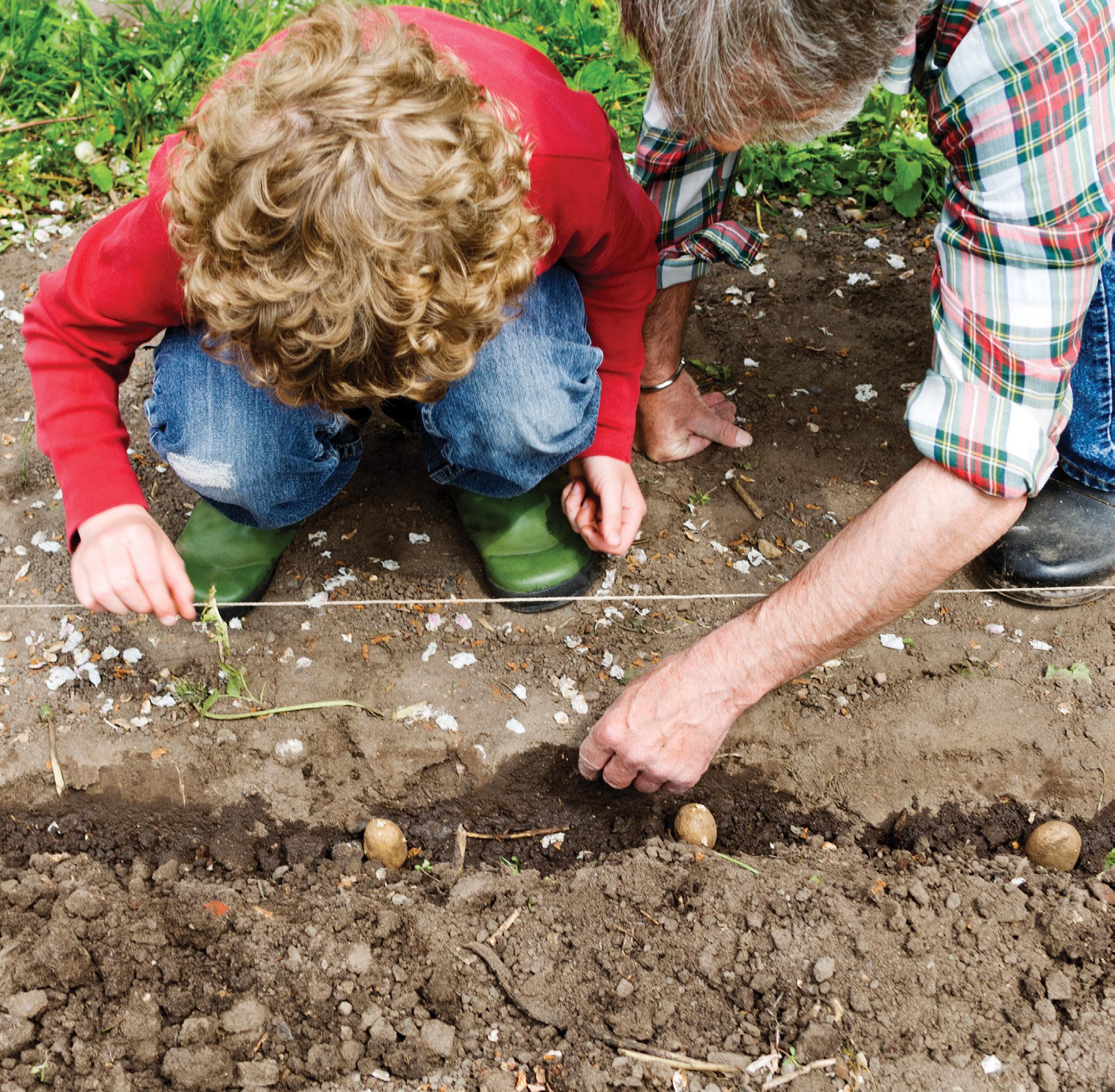
The Marketplace March April 2024 17
Planting seeds involves a certain amount of risk, and faith in God, Nathan Good says.
it, on the condition that they invested that money over the coming year and donated the proceeds back to the church. My little eightyear-old eyes lit up. I had an idea!
I could plant tomatoes in the garden, tend to them, and then sell the fruit of my labors. To the credit of my parents and my pastor, they agreed. I became the youngest member of the congregation to sign out $5 that Sunday.
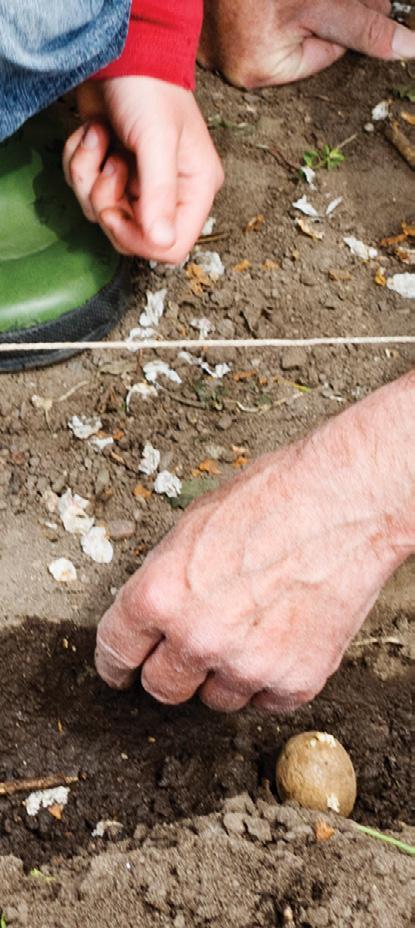
The funny thing about planting a seed is that you have very little control over how it grows. My pastor had planted a seed in my heart, and I went ahead and planted tomatoes in the garden.
Planting seeds comes with some risks. To plant seeds, fruit from the previous harvest must be destroyed. You take something perfectly good and useable and throw it away in the dirt in hopes that something will grow.
That risk can feel scary when you are a subsistence farmer and know that if your crop fails, your family might starve. That risk can feel exciting if you are an eight-yearold with an extra $5 in your pocket.
As much as I love the anticipation and excitement of planting seeds, I hate pulling weeds. Day after day that summer, I had to go out in the hot sun and pull weed after weed.
While my brothers were playing or earning money, I faithfully fertilized and weeded my patch of tomatoes. Ok, most weeks I complained and cried about it. My mom probably pulled her fair share of weeds from my tomato patch in the early morning hours, long before I woke up.
Soon enough, the work paid off, and the tomatoes started
growing on the vine. By the time the summer was over, I had turned $5 into over $100. My pastor planted a seed in my heart that brought a 20-fold return in a single year. Talk about a worthy investment!
He also planted a more long-term seed, the fruit of which would take years to grow.
I now spend less time with my hands in the soil. I find myself planting seeds in other ways. Three years ago, the associate pastor at the church where I am the lead pastor stepped away to begin the path toward chaplaincy.
In our discernment process, I sensed that God might be calling me to go to three-quarter time at church, allowing us to look for a three-quarter or even full-time associate pastor. I threw the idea out there as a seed, and then we watched God cause it to grow.
Next thing you know, I entered the world of “bi-vocational pastor.” There is a certain amount of risk when we plant a seed. When we take something that is perfectly useable and throw it away in hopes that it will turn into something more.
It takes faith that God will do his part in providing resources and opportunities. It takes the mundane work of pulling up distractions and pouring in the necessary nutrients to create the conditions for growth.
When we combine our faith in God with our faithfulness in doing the work he calls us to, we will reap a harvest, if we do not give up (Galatians 6:8-9).
Does that mean that if you eat and exercise well, those seeds will always grow into health and long life? If you invest early and wisely, you will grow wealthy and have all you want. Perhaps, although we know that life does not always
work out that way.
Jesus warns in Matthew 6:1921, “Do not store up for yourselves treasures on earth, where moths and vermin destroy, and where thieves break in and steal. But store up for yourselves treasures in heaven… For where your treasure is, there your heart will be also.”
In Galatians 6:8-9, mentioned above, the Apostle Paul encourages us to sow to the Spirit in order to reap eternal life rather than sowing to the flesh, from which we reap destruction. He says, “Let us not become weary in doing good, for at the proper time, we will reap a harvest if we do not give up.”
The theme that emerges throughout the New Testament is not about investing in order to grow our own nest egg beyond what we reasonably need or to ensure that we have wealth to pass on three or four generations down our family line. Instead, we are encouraged to give generously so that we might reap a “harvest of righteousness” (2 Corinthians 9:10).
What seeds has God given to you to sow? They could be financial blessings that you can use to invest in the lives and businesses of those less fortunate than you. Perhaps it is wisdom that you can plant in the minds of youth and young adults as their mentors.
It may be character that you have developed through your life that you can use in peace and justice efforts in your own community.
Whatever it may be, may you sow to the Spirit, trusting God to provide the resources and opportunities for growth and investing your own time and energy into pulling the weeds and pouring on the fertilizer. .
Nathan Good is a pastor at Swamp Mennonite Church in Quakertown, Pennsylvania. He also operates Customized Coaching, a leadership coaching and transition advisory firm.
18 The Marketplace March April 2024
Maps for more connections
Entrepreneur uses GIS technology to connect farmers and food manufacturers
Kwaku Twum has always been interested in food systems.
Growing up in Abetifi, Ghana, a suburb of the capital, Accra, he was fascinated by the work of his mother. She bought tomatoes from a wholesaler and sold them at a market near their home.
He would help sell the tomatoes on Saturdays and some Sundays after church.
He developed a relationship with other vendors in the market. They used to package food for him to take back to the boarding school where he was doing his high school.
In his teen years, he heard farmers and vendors complaining about feeling cheated. Traveling to farms with his mother, he learned about problems with postharvest losses, which forced them to sell their produce at low prices.
“It was quite an interesting experience for me. I’ve always loved the dynamics in food environments.”
Now, he is using his background in geographic information systems (GIS) — computer systems for capturing, storing, checking, and displaying data related to positions on Earth’s surface — to build a business that connects small-scale farmers with food processing companies.
manufacturers. Its flagship offering, Mapmate, is a subscription-based GIS product that helps food manufacturers understand farmers.
A patent application for the product is in process, Twum said.
Mapkot has a pilot program underway in Ghana with two food manufacturers. The first is APSC, a company that processes ginger and chilies that it buys from small-scale farmers.
in the program to 2,500 this year.
At the same time, he is doing doctoral studies at the University of Waterloo in southern Ontario. He won $5,000 in seed capital for Mapkot from Velocity, a UWaffiliated new business accelerator, in Velocity’s fall 2023 pitch competition.
Twum’s primary interest during his school days was technology. “The one area that excited me more was information systems that are relatable.”

The second firm is SweetLife Group — a company that uses organic berries to make fruit powder, tablets, candy, and other products.
He co-founded Mapkot Technologies to bridge information gaps between growers and
To date, Mapkot has profiled 750 farmers who are getting support from APSC. Twum hopes to more than triple the number of farmers
Some of Accra’s suburbs were informal communities that had frequent problems with people being displaced due to flooding. “Personally, we had issues with displacements because of floods.”
That experience made him want to learn the root causes of the problems. He read whatever he could on the issue, and then did his undergraduate studies in human settlement planning. A course in geographic information systems sparked his interest in learning how this could be applied to flooding issues where he lived. His major project took him to slums facing similar flooding challenges and led to a published paper on the topic.
He wanted his findings to be “known to the whole world.” Almost 40 researchers in Africa, Asia, and America have cited his work.
For his master’s studies, he decided to explore GIS applications further. He came back to his passion for food, and how GIS can support
19 The Marketplace March April 2024
Kwaku Twum
food systems in urban areas.
He used GIS to model food stress areas in Accra. These are similar to socalled food deserts in North America, neighborhoods without easy access to grocery stores.
High land prices made it difficult for farmers to grow crops, and lack of access to stores resulted in high food prices. He found a direct relationship between physical access and economic access to food.
Those findings led him towards a professional career in using GIS to support food companies.
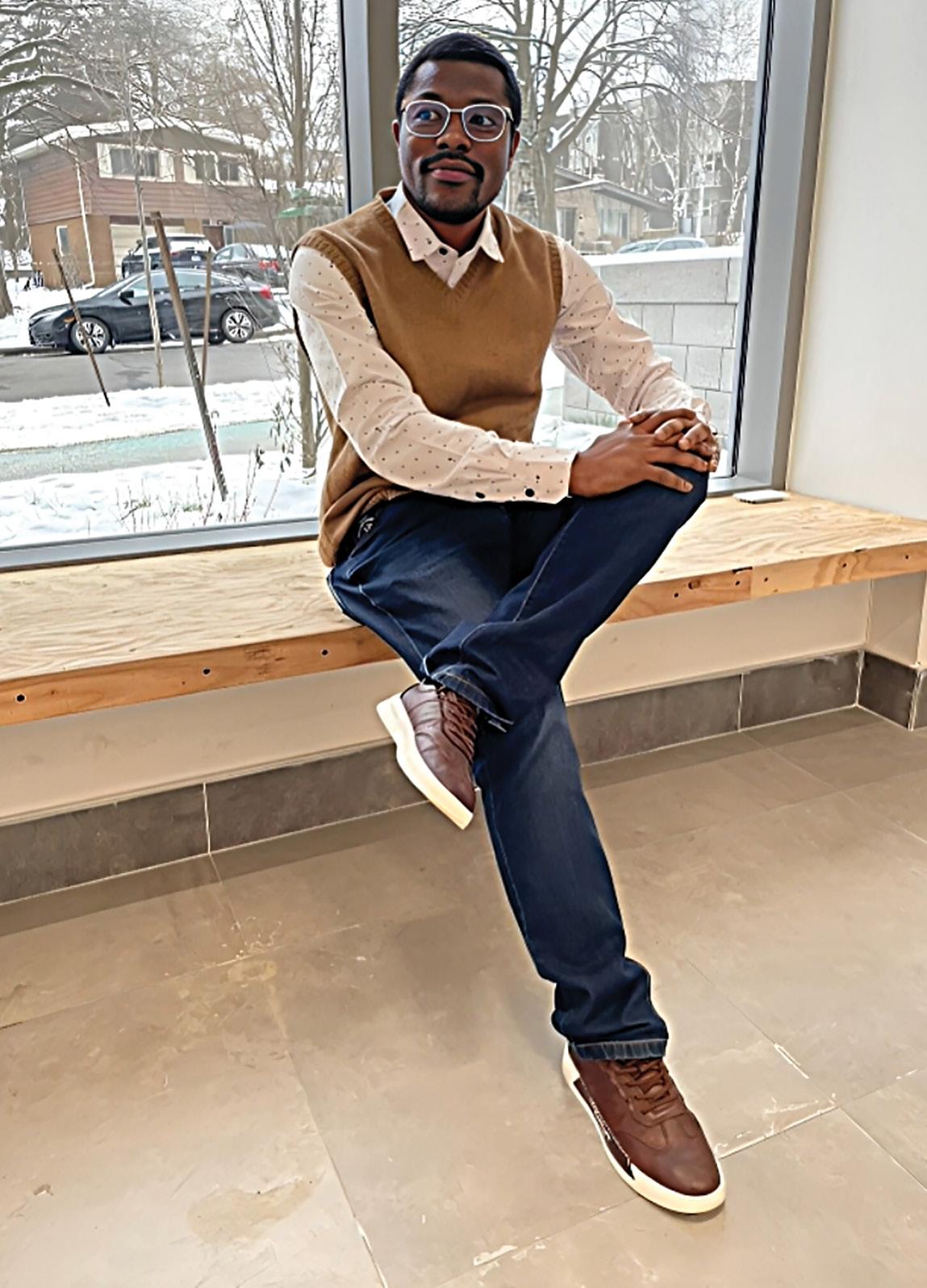
Kwaku Twum says the biblical call to love your neighbor as yourself “drives my enthusiasm for innovation and entrepreneurship.”
Mapkot started in 2019 as a technology consulting firm, doing information technology projects for various firms.
Twum’s earlier research work was in the cocoa sector while working with Koa, a Swiss-Ghana company that upcycles cocoa pulp waste into meaningful products like fresh juice and concentrate powder. The word Koa means impact.
“Working with Koa in the cocoa sector was eye-opening for me,” he said, citing issues of deforestation and child labor within that industry.
As part of his work with Koa, Twum developed a blockchain, traceable platform so that payments to farmers are tracked, traced, and monitored in real time. “For the first time, in the cocoa system, we challenged that problem of paying farmers right.”
Other companies have expressed interest in adopting the system.
Twum’s faith is a key motivator for how he approaches business. “I am unapologetically a Christian,” he said. I am not shy about it.”
That can be difficult for a businessperson, even in a country where over 70 percent of the population is Christian, he said. “There are some things that you can’t do, there are some areas you can’t go, there are some activities that you can’t engage in.”
Respecting people and encouraging them in the challenges they face is one of Twum’s core values. But in some areas, people encourage violent ways of getting what they want, he said.
“For me, how you treat people matters a lot.”
At one point, he ended a consulting engagement due to a clash of values. A client refused to either compensate workers for extra hours or to provide overnight shelter for workers who otherwise needed to travel long distances
daily to and from their work site.
Reflecting on that experience, he thinks about the biblical teaching to love your neighbor as yourself. “It makes me always have that in the back of my mind. It drives my enthusiasm for innovation and entrepreneurship.”
Twum admits that the combination of graduate studies and working on a startup thousands of miles away can lead to sleepless nights and weekend work.
However, he believes the synergies between his university courses and the business pilot provide an opportunity to leverage both activities. “For me, it’s about the passion. What drives me is the passion for what I do.”
Mapkot’s other co-founder, Daniel Buston, has quarterly inperson meetings with APSC about its pilot. The company also sends monthly feedback reports and has a 24-hour virtual assistance team.
Twum may go back to Ghana once or twice a year during his studies. “I need to get approval from my wife, too.”
Mapkot’s work is supported by 45 commissioned “volunteers” who have an understanding of technology in each of the communities where it enrolls farmers. “Culture is one of the drivers of our solution.”
The volunteers, who act as the company’s “eyes on the ground,” are trained in information technology skills, including data analysis. “We go deeper on the ground to understand the real
20 The Marketplace March April 2024
issue,” Twum said in describing the firm’s competitive advantage.
Mapkot has social enterprise as well as profit goals, Twum says. The firm wants to use its platform to bridge gaps in under-privileged communities. Its work with volunteers has already convinced a woman who was a high school dropout to enroll in a STEM (Science, Technology, Engineering, and Mathematics) program.
The company is developing a new product called Mapforms. That data collection tool will provide flexible data collection to help companies leverage data and get better insights from that data.
The most well-known forms products, such as Google or Microsoft Forms, require Internet access and focus on particular data fields, he said. Farmers who can’t read and write struggle to share relevant insights.
Mapkot’s new product hopes to overcome these problems and be language agnostic, incorporating voice and image recording.
Its third product, Mapmove, helps with vehicle tracking and trip monitoring. It can be used to request or track vehicles, a sort of digital replacement for a human dispatcher. The product was piloted in 2023, and Mapkot is now working to incorporate improved trackers.
Food processors pay a monthly or annual fee based on the number of farmers they get access to using Mapkot’s system.
The Mapmate product has valuable applications for many crop areas, including the cocoa sector, he said. The predictability of cocoa yields is a major problem, with little to support farmers in collecting data.
Demand for cocoa often outpaces demand. There is never enough pulp produced to meet processors’ needs, he said.
Farmers are enrolled in the Mapmate system by trained volunteers and food manufacturer extension officers.
Profiles are completed in English. The company plans to add French profiles as well. That will assist its plans to expand to the Ivory Coast, where French is the official
language, and to other countries where both languages are used.
The Mapmate product works both offline and online. Information can be added through a phone or a tablet. Data and photos taken synch to a database once the user gets to an area where internet access is available. .
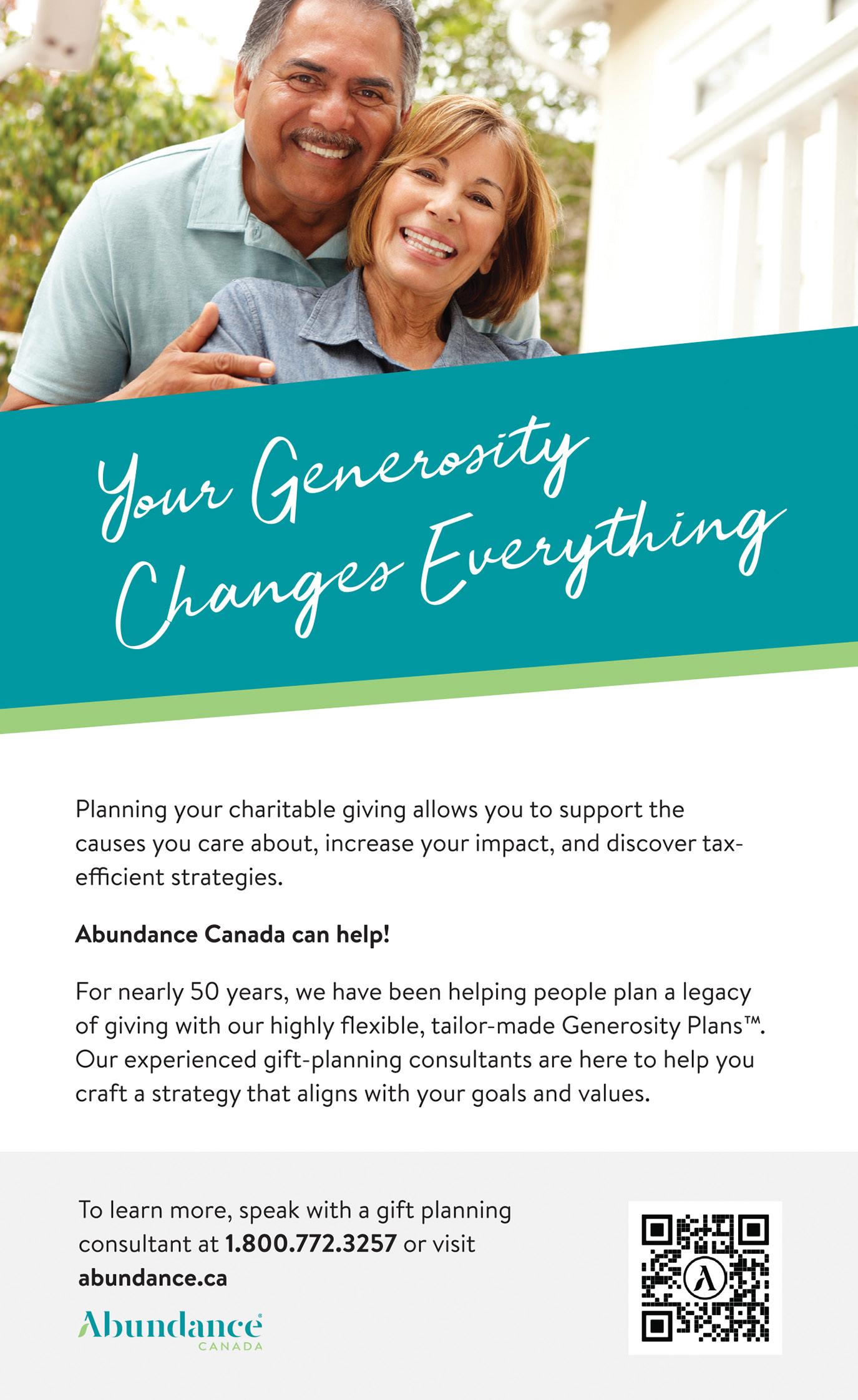
21 The Marketplace March April 2024
A call to face and address relational struggles
Unburdened: A Lenten Journey Toward Forgiveness by Carol Penner (Herald Press, 2024. 200 pages. $16.99 US)
Carol Penner’s call to action during the season of Lent goes much deeper than symbolic actions like giving up a favorite treat or pastime. She wants readers to grapple with sin, repentance, and transformation.
In “Unburdened,” she provides an important and increasingly uncommon challenge. She describes Lent as being a time of thinking about letting go of the burden of sin, a time to journey toward giving and receiving forgiveness.

spiritual discipline, she writes. The situations she describes are far from easily resolved. The book lists a number of challenging situations, involving violence and betrayal in the Old Testament, in modern society, and in Penner’s own family of origin. Without minimizing the inherent challenges, she commends the practice of lament and humility. “Unburdened” is an important book. — MS
These women have worked with the Urban Expression group that invites new communities of Anabaptism in Britain. Ellish writes, “I am convinced that the Anabaptist vision…offers an inspiration and rich resource for church planting and reimagining the nature and purpose of Christian communities.” Sethuraman works at SoulSpace in Belfast, Northern Ireland. She writes: “SoulSpace still continues to grow and is beginning to influence church (and political) circles in Ireland…”
The book includes a six-week set of daily scripture passages, issues to reflect on, prayers, and questions for reflection.
The weeks are arranged by topic, beginning with seeking repentance, then addressing sin, pursuing freedom, responding to brokenness, building forgiveness, and treading holy ground.
The book concludes with a guide for small group study.
Recognizing that many have wanted to keep such matters private, Penner notes that “there is work to be done to make our repentance visible.”
A former Mennonite pastor and now college professor, Penner notes that Anabaptists are part of the peace church tradition, which holds that Christians should not respond to violence with violence. Since conflict is a constant both in congregational and family life, forgiveness is a crucial
Putting beliefs into action
The New Anabaptists: Practices for Emerging Communities by Stuart Murray (Herald Press, 2024. 252 pages 18.99 US)
Stuart Murray is best known for his 2010 book “The Naked Anabaptist,” an exploration of the core beliefs of Anabaptist Christianity. “The New Anabaptists” is a follow-up directed at a North American audience. The strongest part of this book is three personal stories written by Alexandra Ellish, Karen Sethuraman, and Juliet Kilpin.
Kilpin works with Peaceful Borders, a project of the Anabaptist Mennonite Network, that works to support asylum seekers, refugees, and migrants to build communities of mutual support and solidarity. None of these three significant ministries will turn into a megachurch or mega-ministry, but they are committed to the gospel of Jesus.
The other strength of “The New Anabaptists” is chapters on core convictions and Anabaptist practices. I don’t think you can do all of the Anabaptist practices. But I assume that thoughtful Christians are already doing some of these practices. They are all at the center of Anabaptism life and faith, and that makes them challenging.
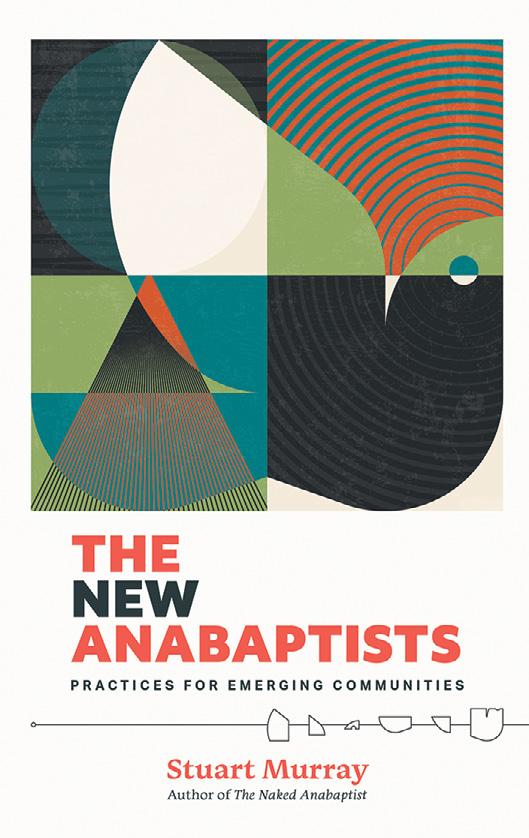
Choose one that you have not done before.
Pray with it and see how it might inspire your following of Jesus of Nazareth. — Fred Redekop.
Fred pastors Poole Mennonite Church. To receive his blog, PONDER ANEW 2024, email him: fred. redekop@gmail.com
22 The Marketplace March April 2024
in brief
Books
Development lessons through a filmmaker’s lens
My University of the World: Adventures of an International Film & Media Maker by Neill McKee. (Nbfs Creations, LLC 2023 522 pp., $23.95 US)
McKee, a native of Elmira Ontario, takes us with him through four decades of international development work. Readers will be entertained and engaged by the inevitable adventures of traveling to the most underserved global communities, all while carrying around heavy camera equipment.
But this is more than a travelogue or a memoir. There is insight on how global development projects are designed to meet desired outcomes while keeping in mind the local context and cultural practices.
It is also a case study on how global development workers
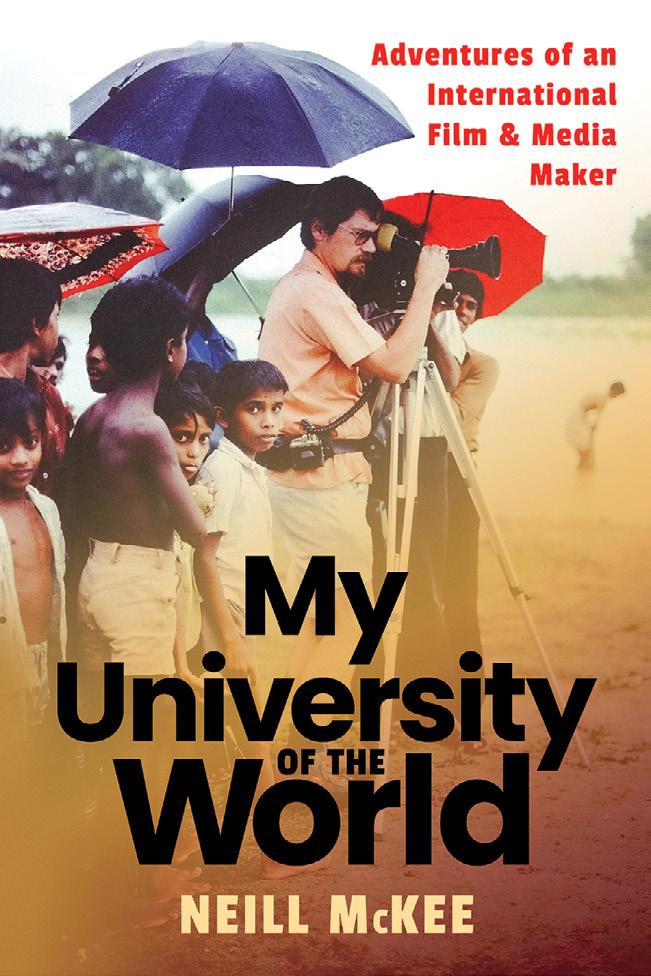
manage their personal lives. McKee meets Beth, an American missionary kid teaching in Japan.
They negotiated not only when and where to marry (Uganda), but
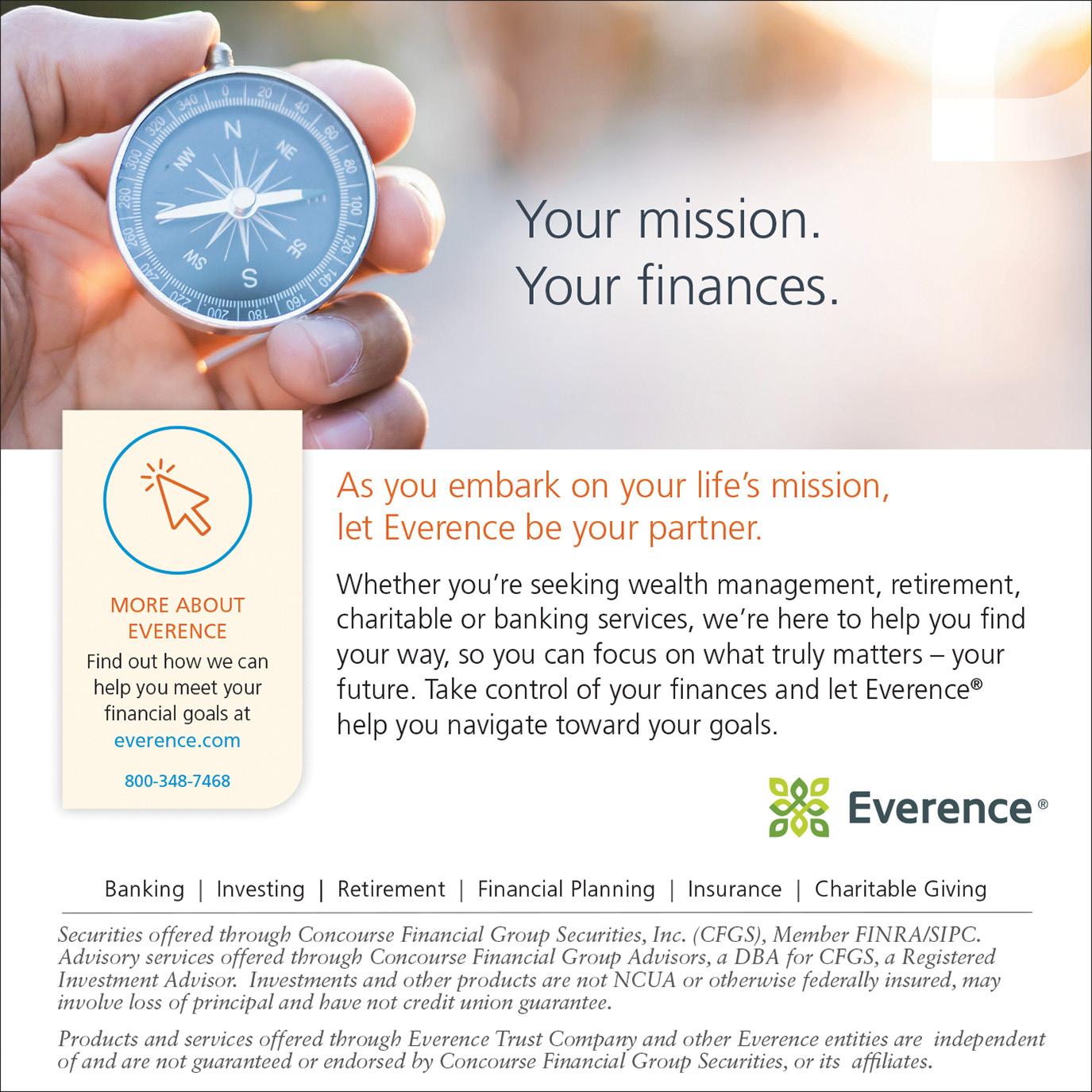
also how to continually balance individual career opportunities with the needs of a growing family. This becomes much more complicated when the opportunities lead to far-flung, and divergent locations.
His media career started in 1970 after two years of teaching high school in Borneo with CUSO International. He was hired by CUSO to make a 16mm film as a recruiting tool for CUSO volunteers. They liked the result well enough to hire him full time to film CUSO projects globally.
In 1975, he moved beyond the “one-man film crew” phase for CUSO to creating films for the International Development Research Centre (IDRC). These films showed the research results for more effective food production and solutions around health care, low-income housing, water and sanitation, land tenure, family planning and more. The films were intended to provide local communities with knowledge so they would be better equipped to manage their own challenges.
In 1990, he became UNICEF’s director of communications in Bangladesh. For the rest of his career, his work primarily had to do with the AIDS epidemic in South Asia and Africa.
He led a team that created cartoon characters Meena (South Asia) and Sara (Africa). These TV series became messengers significantly impacting youth behavior.
When information was available, McKee included information in each of the short chapters about the long-term impact of the project he filmed or designed. To this day, Meena and Sara are still popular with young adults. The model has been used in East and Southeast Asia as well. . Joyce Bontrager Lehman is a former MEDA staff and board member.
23 The Marketplace March April 2024
in brief
Books


































